#i did it i finally posted something!!!
Note
OH MY GOODNESS!! I JUST HAD A THOUGHT!!!
Ok, so I just needed to send this to you before I forgot! (That doesn't mean you have to write it yet though, whenever your ready!!)
Ok, so you know how you wrote little!Elvis first snow day? You should totally do that with the littl!reader if you haven't already! Like OH MY THIS WOULD BE SO CUTE! "Y/n put your scarf back on don't make me count to 3!...no put your jacket back on right now before ya get sick! I already told ya don't make me tell ya again." Type of things, like OH MY THIS WOULD BE ADORABLE. "You a bit cold now darlin'? Well why don't we get ya warmed up inside with a fluffy blanket, and a hot chocolate huh?" type of stuff🥺🥺🥺
I love cg!Elvis it makes me so happy!
Just thought I'd share this little idea with you!!
💗
somehow this ended up with 1k words?? hope you enjoy 💞 thank you for the request!!
wc: 1k
a/n: def not proofread, sorry for the mistakes as i wrote this on my phone lol
masterlist

once you got with elvis, he had you moving straight to tennessee and into graceland. with this being your first winter with him, you hoped it'd snow considering it never snowed where you were from. you were probably annoying elvis with the way you'd ask if it was going to snow today, always getting hit with the “do i look like a weatherman?” answer. honestly? sometimes.
but when you asked on another day, preparing yourself for the same answer as always, elvis took a look out the window and hummed. “y’know what? i think it just might.”
you were glued to the window the whole morning, waiting patiently for the snow as elvis played on the piano softly in the background, occasionally glancing over at you and chuckling as your eyes never left the window. you were determined to see the first snowflake.
at some point, you didn't realize the music stopped and elvis appeared next to you with a warm mug of hot chocolate topped with marshmallows. “any snow yet, yittle?” he asked, taking a seat next to you.
the mug warmed your cold hands, sighing sadly. “no.” you muttered, taking a sip from the mug. “i don't think it's gonna snow, daddy.”
“hm, don't be so sure. i have a good feelin’” he grinned, wiping at the chocolate stache above your lips with his thumb. “silly.” he chuckled to himself.
as the day progressed, there was still nothing. elvis eventually caught you dozing off, helping you up to get you to the bedroom for a nap. he knew you'd be mad if you missed the first snowfall, but the snow on the ground you'd wake up to would make up for it.
the sound of your name being whisper-yelled woke you up, followed by a soft touch to your side. elvis brought a hand up to your face, pushing your hair aside, “baby, sorry to wake ya. but i think you should come take a look outside.”
you glanced up at him, rubbing the sleep from your eyes. “what is it?”
“c’mon, get up! come see for yourself.” he grinned.
slowly getting out of bed, you padded your way down the steps and followed elvis to the front window, gasping at the white sheets laying over the grass of graceland. it was the first time you’d ever seen anything like it and it was even more beautiful than expected. “daddy! it's snowing!” eager to go out into the cold, snow, you reached for the door handle only to be stopped by elvis.
“nuh-uh, not until you're dressed. it's cold outside.” he said sternly, pointing a finger at you.
“ugh, do i have to?” you whined, stomping your feet.
“do i have to?” elvis mocked, “yes, yittle. you have to. now c'mon, take your pretty self up the stairs.”
you let out a huff and stomped up the stairs with elvis following behind.
it was funny, really. he knew the moment you stepped outside without a coat, scarf or even gloves, you'd whine about how cold it is. but of course, the moment he attempts to bundle you up, you whine anyway. it was just one of your many quirks. he caught back a laugh as you scowled while elvis attempted to dress you, bundling you up extra warm due to the almost negative degrees outside. he finished it off with a scarf, wrapping it around your neck nicely. “now can i go outside?” you asked, a hint of annoyance to your voice.
“go downstairs and wait for daddy.” he nodded, gesturing to head out the door. he slipped on his own coat and scarf, less bundled up than you and headed down, watching as you began to take your gloves off. “nuh-uh, put ‘em back on. if ya wanna play in the snow, you gotta keep ‘em on or your hands will get all cold and frozen.”
“but why aren't you dressed like me?”
he sighed, “because i’m an adult and you're just a little one. little ones are more prone to get sick, now enough arguin’ , let's go out. it's dark out so be careful.” the moment he opened the door, you zoomed out into the cold air, throwing yourself on the ground and rolling around in the cold snow as elvis sat on the steps and watched.
you got up and ran around the lawn, shuffling your feet through the snow. elvis watched you happily, making sure you didn't attempt to take anything off that kept you warm. just when you thought elvis wasn't looking, you attempted to take off your scarf sneakily, but elvis quickly caught you, standing up. “hey! put that back on! don't make me count-that's right, leave it.” he crossed his arms for warmth, sighing. “now, don't go takin’ off the jacket too. ya tryin’ to freeze up?”
you squatted down, scooping up snow into a pile on the ground. the gloves were annoying you, not doing much to help you pack it up. you slipped them off, working on your little pile again with your bare hands. your hands began to freeze up, becoming numb from the snow. maybe elvis had a point on the gloves….
slipping them back on, you titled your head up and stuck your tongue out, letting the snowflakes fall on your tongue. it was surreal being able to see snow after never being able to experience it. it was even more special for elvis, he loved seeing how happy you were even if you were being a bit stubborn about keeping warm.
elvis walked up to you, patting you on the head. “whatcha doin’ silly?” he chuckled.
“daddy, ‘m gettin’ cold….” you frowned.
“is that right? well, we can't have that. let's get ya inside with a warm blanket and maybe some more hot chocolate, how's that sound?” he smiled.
“can i come back out after?”
he placed his hands on his hips, looking up at the sky and back down at you. “how ‘bout you come back out tomorrow? daddy’s gonna be snowed in anyway.”
without putting up a fight, you trusted him and hoped the snow would still be there tomorrow. “okay.”
“c'mon yittle, let's get ya warmed up. can't have you freezin’ up!” he helped you up, brushing the snow off of you before bringing you back into graceland to warm up and head to bed.
63 notes
·
View notes
Text
REPLICA PLAYLIST

MUSIC UNDER CUT
I have been receiving requests for any songs that inspired Replica, so here, have my personal playlist. Sorry it’s not Spotify/Soundcloud but they don’t have some of these songs available so uh… guess you’re stuck with YouTube vids. For fun I'll include my personal titles for them (which might give a few hints of what to expect in the future/end).
Replica Main Theme - “Die for You” by Grabbitz
Like Father Like Son Like Brother (Omega and Shelldon) - "As Above So Below" by Alistair Lindsay
Mikey's Theme / The 1st Vision - "Suzume no Tojimari" by Nanoka Hara
Military (Mad) Dogs / Central Park Colony - "Imperium" by Madeon
Shanghai - "Icarus" by Madeon
Boom Goes the Donnie-mite (Mikey/Donnie vs the Sweeper) - "The Red Zone" by Mitsuoto Suzuki
The Day the Sky Bled Red - "7 Seconds Till the End" by Nobuo Uematsu
Going Out Like a Boss (Raph and Leo) - "Agape" by Nicholas Britell
Remembering the Right Way (Mikey and Leo) - "The Souls of Many" - by Alistair Lindsay
Mystic Hands / The 2nd Vision - "Am I Dreaming" by Metro Boomin x A$AP
Book 2 Trailer - "Sea Dragon" by Covet
7 Years Later - "Iron" by Woodkid
Leo's Theme / Attack on the Labor Camp - "Ego Death" by Polyphia
Omega's Theme - "Touch" by Daft Punk
Flat Lines (Omega Alone) - "Die Toteninsel Emptiness" by 1000 Eyes
Spear - "Monsters" by Tommee Profitt
Final Protocol - "The Kraken" by Katie Dey
Rise / Epilogue - "Close in the Distance" by Masayoshi Soken & Tom Mills
I will admit, it's a little embarrassing since you can easily see the patterns of what I've been listening to for the past year or two. I swear I listen to more than just videogame OSTs, these songs just jive well with the story and I often find lyrics distracting when brainstorming scenes. Regardless, the music I listen to is such an important part of my creative process and some of these songs really defined the scenes I now have locked in my head. So I figured it was only fair to give them the credit they're due.
I will continue to add to this playlist, and will note in comic updates when one of these songs is applicable!
#lofi Donnie anyone?#also sort of celebration for 19k followers wow#should I do something else for it?#I particularly like Leo's theme being titled Ego Death#very fitting#Also the final song makes me cry because the lyrics are just too dang perfect#I'd like to do an animatic with the song when this story is all done#check out the lyrics if you get the chance#in fact I'd like to do an animatic trailer for the Book 2 Teaser#we'll see though#i can't allow myself to get too distracted from the comic itself haha#replica#rottmnt replica#kathaynesart#playlist#music#spoilers? but like... you know how it ends in the movie so not really?#kind of?#did you see the rise movie?#then you’ve been spoiled sorry#posting again at an ungodly hour#I am tired#save rottmnt#rottmnt#TMNT#Donatello#casey jones
4K notes
·
View notes
Text

mourning black and the death of ideals
#i haven't moved on from this yet. btw. i'm still here#finally decided to draw the thought i've been ruminating over for days on end bc it's like a parasite eating away my brain#stated this on the initial post i made days ago but there's just smt so gut wrenching and sickening#about how dazai will have worn black exactly twice in his life: once as a member of the mafia and now at kunikida's funeral#a color that initially signified devotion to the mafia and his demon prodigy alias now signifies his grief#him having to wear black again at the funeral of another doomed fatalist who chose his heart over his survival. his own partner.#kunikida's death being so reminiscent of the tragedy that initially caused him to defect and flee#and everything tying together full circle and effectively breaking him#asagiri rly said fuck knkdz it's doppover we lost gang 😭😭😭#why did bro leave that fucking notebook behind#fool. do you know that angst potential you have left me to work with?#love never won in bsd. it lay dead and festering#i don't know how much longer i can keep saying i miss them. i'm going to kill myself if he doesn't come back#i've never wanted something to be death bait so desperately#bungou stray dogs#bungo stray dogs#bsd#dazai osamu#osamu dazai#kunikidazai#knkdz#kunizai#(??? technically. its implied anyway)#lotus draws
3K notes
·
View notes
Text
Steve Harrington was wearing a Hellfire t-shirt.
It was far too tight on him, the name of the club stretched wide over his chest. The sleeves dug into his biceps, making them pop even more than they usually did, and that was before he crossed his arms.
Worse?
It was short.
Which meant the damn shirt was constantly riding up to give everyone a nice show of the smattering of hair that trailed down past the band of Harrington's jeans.
The same hair that Eddie was determinedly not looking at.
“Henderson, a moment?” He crooked a finger, a smile on his face that was more feral than welcoming.
Rather than cower or even acknowledge that Eddie was two seconds away from murder, Dustin just gave him a gummy grin, all too pleased with himself and his scheme.
“Sure Eddie. Steve, don't just stand there, go help set the booth up!” Dustin gestured to Hellfire’s sad little table, crammed all the way in the back of the gym.
Jeff and Gareth both reacted to the suggestion like a rabid squirrel had been set upon them, nervously inching towards the other side of the booth as Harrington sighed and--shockingly--did as he was told.
‘What,’ Eddie thought angrily, ‘in the everloving fuck.’
“Do you guys mind if I set this down on the table?” Eddie heard Harrington ask as he stormed away, Dustin on his heel.
They wandered just around the corner, out of sight and hopefully, out of the fallen king’s hearing range.
Eddie wasn't sure if Harrington would try and white knight the very much deserved dressing down he was about to give.
Didn’t want to chance it, considering the downright weird relationship he had with Hellfire's freshmen.
(While he’d heard many a tale at his table regarding King Steve since the newest recruits had joined Hellfire, most of them dissolved into arguments without ever really going anywhere.
Best anyone could figure out was that Dustin and Lucas had a bad case of hero worship, while Mike owned a begrudging amount of respect that hailed from a series of misadventures.
The very same misadventures that, despite all protests to the contrary, was clearly some sort of babysitting gig for Harrington.)
Either way, plenty of the King’s court would have loved to take this opportunity to fuck with Hellfire.
Given that Henderson was absolutely too old to require a babysitter at fourteen, Eddie would bet his lunch money that was what Steve was here to do.
Something the club couldn’t afford since they were forever and always two seconds away from being stripped of club status and banned from school grounds.
“I would love to know what went through that all A’s brain of yours when I said,” Eddie whirled on Dustin when they were firmly in the clear, voice low and furious. “no Henderson, do not invite King Steve to help, he is an invading force and would ruin our peaceful kingdom!?”
He clasped his hands behind his back before leaning into Dustin’s face. “Because clearly whatever you heard wasn’t that.”
To Eddie’s continued frustration and confusion, Dustin did not treat this like the threat it was.
None of the freshmen had ever truly treated Eddie like a threat--had somehow skipped that part of the usual onboarding ritual entirely.
Eddie, town freak and drug dealer, who had cultivated his looks and craziness to such a degree that most everyone steered clear, wasn’t used to it.
Everyone had been afraid of him at some point in this shitty school. Jeff, Gareth, hell even half the staff--and that the dorky trio of fourteen year old's clearly thought this all was play-acting made his eye twitch.
Even if it was--maybe, sometimes--welcome.
“I know what you said, but I’m telling you I’m right.” Dustin argued immediately, and oh God, he was using that tone again.
A hand went up into the space between them and Eddie groaned aloud, knowing what was coming.
“First,” Dustin ticked a finger up, “Hellfire really needs the money. Even thirty dollars would get us new figures, but more than that, if we don’t fundraise, we can’t go to Gen Con!”
Dustin's eyes bored into Eddie’s, full of fire and conviction
“Yes,” Eddie said through gritted teeth, “but--”
“Second!” Dustin cut him off, and God the little shit even threw him a look while he did it, like Eddie was the one being ridiculous here!
“We had to fight just to get our table! Principal Higgins was in algebra today practically begging the mathletes to show up, but then tried to tell us we couldn't be here? That’s messed up!”
As if denying them a spot to fundraise was the worst thing that asshole had ever done.
Eddie sighed, breath blasting out of his mouth like a dragon’s.
“Because people think we’re freaks and satanists, Henderson. You don’t typically invite freaks and satanists to the school’s annual Holiday Bazaar. Especially not when all the local moms are paying to hawk their bullshit crafts and tupperware!”
It was more than that of course. The Hawkins High Holiday Bazaar was a tradition spanning several years now. Starting in the gym and spilling clear into the parking lot, everyone from local artists to even some local shops came to host a small table for the day, thus growing the event from a small school fundraiser to a Hawkins' “must-do.”
Half the fucking town was here to sell, and the other half was here to shop, which meant Principle Higgins had wanted Hellfire banned from the fucking premise.
Eddie had been forced to pull out one of his trump cards he’d been saving--blackmail on Higgins that related to the man’s not--so--legal addiction to Percocet that he relied on Reefer Rick for.
(And bless Rick, that hadn’t been the only tidbit he’d shared with Eddie about Higgins. That information, however, Eddie needed just so the asshat wouldn’t give him the boot from school entirely.)
The only reason Eddie had pulled it out to secure their rightful spot, was because of Gen Con.
It was Hellfire's White Whale, their grand adventure, and this was going to be his year to take his friends on one last epic quest to make memories of a lifetime surrounded by people who understood them.
Come hell or high water, Eddie was going to Gen Con--but being able to fundraise by selling wares and baked goods at the stupid Holiday Bazaar would go a long way to help.
Even if he had to listen to the band repeatedly play ear-bleeding renditions of Christmas songs.
“All the clubs get to have a table, and we’re a club!” Dustin continued, like it was that simple. “But you know, I get it. We look scary.”
He gestured down to his own Hellfire shirt, before gesturing towards Eddie’s entire outfit.
Like Eddie didn't know what he looked like, let alone that he'd made this outfit specifically to scare people away from him.
(And maybe add some rockstar flair to this dinky little hick town.)
“You know who doesn’t look scary?”
Dustin held out his hands and swiveled his body like he was presenting a prize instead of gesturing in the vague direction of;
“Steve!”
Eddie’s left eye twitched.
‘You can't kill him, you need his character for the campaign.’ He told himself firmly, even if he envisioned strangling Dustin like a chicken.
Cartoon squawking and all.
“The King isn’t going to help us fundraise, Dustin.” Eddie said, in an effort to break down why Harrington couldn't be here. “He's just going to cause us problems that we can’t afford to have.”
So many problems, half of which Eddie couldn't think of because if he did, he'd start spiraling.
“Really? Because as you keep saying, Steve used to be the King. People love him, Eddie! Mom’s love him.”
Eddie had pulled himself back up to his proper height a while ago, and now rocked back on his heels while he ran a hand down his face.
There was no getting through to Henderson when he was like this.
Not unless Eddie really lost it, and it was practically club lore that he only lost it when someone missed an important game.
One cannot keep a herd of sheep if their flock is terrified of them, after all.
(“Perhaps you’re just a giant fucking softie.” Tiff, one of Hellfire’s graduating members, told him once. “Honestly dude, I bet you throw up stuffing.”
“Shut up Tiffany, your choker is on backwards again.” He'd spat back, completely offended and not at all trying to distract from how true that was.)
“We can’t be satanic if Steve’s the one selling cookies!” Dustin finished doggedly.
“We’re not even selling cookies--that’s not the point!”” Eddie shook his head, hair flying. He was not going to be sidetracked, he wasn’t!
“Harrington is going to end up siding with all the moms about how we’re all wasting time with D&D, if he even spends the whole time at the table. Is that what you want?”
He stuck out a ringed finger, poking at Dustin’s chest.
“Every single person who comes by our table has to be convinced D&D is a writing and math based game. Good for the mind and souls of growing, impressionable children. A game that got a bad rep because of a few silly images.”
A pitch he and Tiff had come up with during the third or fourth time they had to convince an adult that no, just because their shirts had a dragon on it, didn’t mean they were summoning demons in the drama room.
“Harrington can’t do that because Harrington doesn’t even know how to play!”
This Eddie punctuated by throwing his hands in the air.
Given the startled look of the mother-daughter duo passing him by, clearly was louder than he’d intended--but screw it!
He was right!
Hellfire was in a precarious position to both fundraise and do a little damage control among the slightly smarter members of this shithole small town, and Harrington rolling his eyes and gossiping about how stupid it was would hinder that.
“Okay, first of all, Steve’s played D&D with me and he didn’t even kill his character.” Dustin said it like he was unveiling a smoking gun and not lying through his ass--which Eddie would absolutely be calling him on the second he was done talking.
Because King Steve? Play D&D?
'Ha!'
“And he’s not gonna say shit because we--me, and Lucas and even Mike!--asked him to help, and he helps when its serious. I know you have some weird grudge with him, but I’m telling you Eddie he’s our golden ticket to Gen Con!”
“You’re killing me. You are standing here, acting as a friend, when you are bringing a-- a dark force into the midst our of mission--” Eddie hissed, because he was losing the fucking fight and he knew it.
Dustin Henderson was not a man easily swayed.
Had never been, even when the odds were stacked against him (and Grant and Gareth were howling in his ear.)
The set of his shoulders and the glint of the little shithead’s eye meant Eddie wouldn’t be able to use him to oust Harrington--if he even could get him out without the dick causing a massive scene anyway.
As always when outgunned, Eddie flipped to dramatics.
“Betrayed! By my own chosen heir no less!” He moaned, pressing the back of his hand over his eyes as Dustin scoffed.
"Don’t be so dramatic! Steve will help, I promise! Just don’t be a dick to him.”
Conversation apparently over, Dustin turned around to head back to the table
Snidely, he added over his shoulder: “Plus we’ve all caught on to the heir thing Eddie. You tell everyone that so they do what you want.”
The dick.
“You’re too fucking smart for your own good. I’m gonna start feeding you paint chips to bring that IQ down.” Eddie muttered angrily as Dustin went back to their little table.
He gave himself a moment to get his shit together and stomp a foot like a child when Dustin was around the corner and thus couldn’t witness it, before following his wayward sheep back.
Could only pray to any deity listening that Henderson’s meddling didn’t blow up in Hellfire’s face.
#Door Prize#Alt S4#pre steddie#when is it not lmao#Holiday fic#well this is more of a warm up but it has another part#Ive just given up the WIPS are running my life#this is brought to you by a local high schools massive holiday bazaar I went too that had cute band kids running around#could not play music though bless them#I did FINALLY get re employed so things are slowing down but Im hoping to post one more chapter of SOMETHING before the end of dec#and probably the other half of this warm up shes short#steven harrington#eddie munson#baking#special appearance by Adopt a Jocks Tiff#Robin pops up in this in the other half#Dustin Henderson#and his scheming#Steve can bake#0o0 fanfics#stranger things#stranger things fanfic#steddie
3K notes
·
View notes
Text




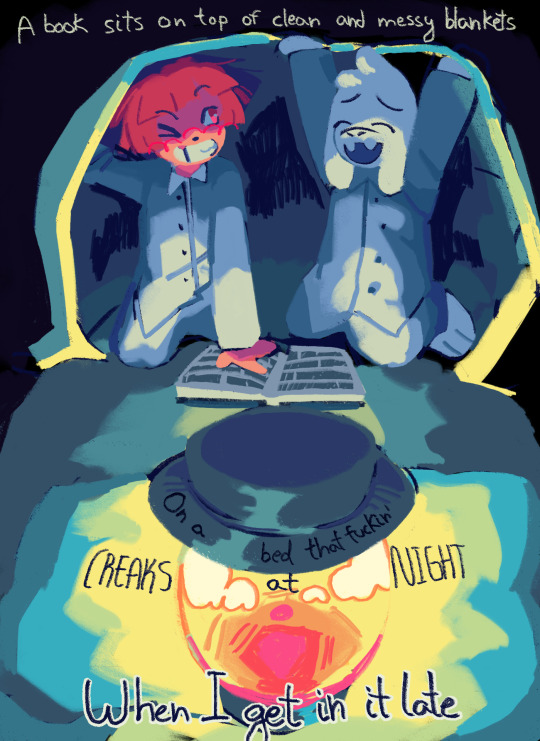






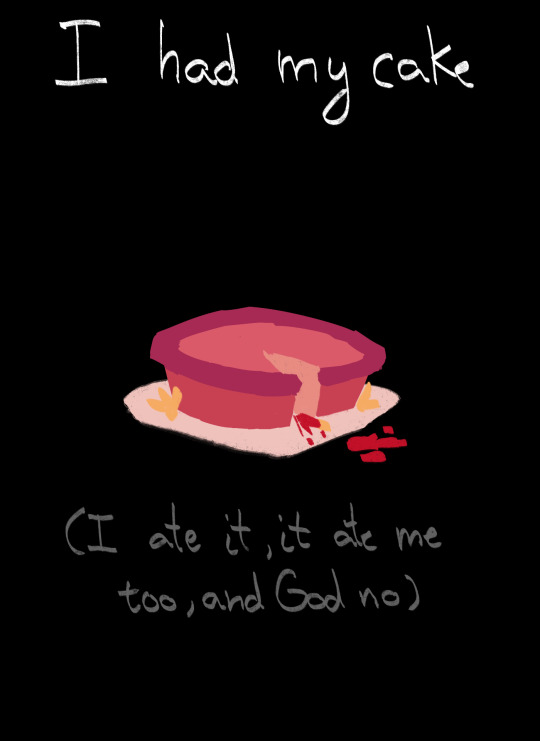
Song - Feel Better by Penelope Scott
#Been thinking about this for a while and I finally did it!#Look at it!#Tbf this song also fits Flowey a LOT#But Chara lives in my brain. so#this is the first time ive done something like this i hope it's good#also if there's any better way to format posts like these tell me cause god knows i do Not know how to use this site#anyways i think about them a lot#im gonna go cry bye#undertale#chara#chara dreemurr#asriel#asriel dreemurr#lyric comic#my art
7K notes
·
View notes
Note
I have encountered issues with JVP in the past in regards to not accommodating kashrut/shabbat observance (and wheelchairs), but previously hasn’t heard about the Mikvah thing. Do you have any sources I can refer to?
Oh boy. Oh boy oh boy oh boy. The noise I made when I saw this ask.
You are probably unaware but I have literally been working on a post on this topic since February. Bless you for asking me about it and giving me a reason to share it. Genuinely. I'm delighted.
Without further ado, now that I've finally finished:
On the JVP Mikveh BS
Some of you are no doubt aware of the Jewish Voice for Peace Mikveh Guide (on JVP’s website here, and here on the Wayback Machine in case that link breaks). You may have seen the post I reblogged about it, you may have seen the post about JVP in general on @is-the-thing-actually-Jewish, or you may have heard about it elsewhere. Or maybe you’ve somehow managed to avoid all knowledge of its existence. (God I wish that were me.) Even if you know about it, even if you’ve scanned through it, you probably haven’t taken the time to read it through properly.
I have.
God help me.
I was originally looking through it to help draft the @is-the-thing-actually-Jewish post back in February, but some terrible combination of horror, indignation, and probably masochism compelled me to do a close reading, so that I could write this analysis and share it with you, dear readers. For those of you who’ve never heard of a mikvah, for those of you who’ve immersed in one, for those of you who’ve studied it intensely—I give you this, the fruit of my suffering, so you too can understand why “Mikveh: A Purification Ritual for Personal and Collective Transformation,” written by Zohar Lev Cunningham and Rebekah Erev for Jewish Voice for Peace has got so many people up in arms.
Brace yourselves. It’s going to be a long journey.
First off, a disclaimer: When I say something is “required in Jewish law” or whatnot, I’m talking about in traditional practice / Torah-observant communities; what is often called “Orthodox.” There’s a wide range of Jewish practice, and what is required in frum (observant) Judaism may not be required in Reform Judaism, etc. Don’t at me.
Second note: I myself am Modern Orthodox, and come from that perspective. I’m also very much more on the rationalist side than the mysticism side of things. I did run this past people from other communities. Still, if I’ve missed or misrepresented something, it was my error and was not meant maliciously.
Third: I am not a rabbi. I am a nerd who likes explaining things and doing deep dives. Again, I may have made errors–please let me know if you spot any, and I’d be happy to discuss them.
Now then. Before we get into the text itself, let’s give some background.
WHAT IS THIS MIKVEH THING ANYWAY?
A mikveh (or mikvah, both they and I switch between spellings; plural mikva’ot) is a Jewish ritual bath, sometimes translated as an immersion pool. Some communities or organizations that run mikva’ot will have a single all-purpose all-purpose, some have separate human- and utensil-pools, and some have separate women’s and men’s pools. The majority of the water in a mikvah has to be “living waters,” i.e. naturally collected rather than from a tap or a bucket. Some natural bodies of water can also be used, such as the ocean and some rivers (ask your local rabbi). The construction is complicated and has extremely detailed requirements. Here’s an example of a modern mikvah:

(By Wikimedia Commons (ויקיגמדון) - Own work, Public Domain, https://commons.wikimedia.org/w/index.php?curid=17373540)
Whoever is being dunked (the scientific term) has to be entirely immersed, and the water has to be in direct contact with all of them. That means no clothes, no makeup, no hair floating on the top of the water, no feet touching the floor, no clenched fists. You have to be completely clean as well, so no dirt is obstructing you from the water.
In essence, a person or thing is immersed in a mikvah to change their/its state from tameh (ritually “impure”) to tahor (ritually “pure”). I use quotes because “pure/impure” aren’t really good translations—they have value judgments that tameh/tahor don’t. There’s nothing wrong with being tameh, you aren’t lesser because you are tameh—it’s just a state one enters when one comes into contact with death and related concepts. (There are also different levels of both.) As a matter of fact, technically speaking even after going to a mikvah basically all people are tameh now—the tum’ah (“impurity,” sort of) that comes from contact with dead humans can only be removed by the Red Heifer offering (see Numbers 19), which we can’t do without the Temple. (Why I say “all” even if you’ve never been to a funeral is a much much longer tangent that I’ll spare you for now.) To quote one of my editors on this, mikvah is “about the natural oscillation between states of ritual purity and impurity. Men go to mikveh after having seminal emissions. Menstruating women go to mikveh on a monthly basis (emphasis added).” It’s just states of life.
In the days of the Temple, one had to be tahor to enter it (the Temple). Archaeologists have found a ton of ancient mikva’ot in Jerusalem that were presumably used by people visiting the Temple, which personally I think is extremely cool.
Nowadays, there are three main traditionally required uses for a mikvah. First, and most importantly, observant married women will go about once a month as part of their niddah (menstrual) cycle, part of practice known as Taharat HaMishpacha, or “Family ‘Purity,’” which at its root is a way to sanctify the relationship between spouses. Until she immerses, a wife and husband cannot resume relations. And not just sex—in some communities, they can’t sleep in the same bed or even have any physical contact at all.
The second use is for conversion—immersion is a central part of the conversion ceremony. One enters the water a gentile, and emerges a Jew.
The third usage is a bit different as it’s not for people. Tableware—plates, cups, etc.—made of certain materials have to be immersed before they can be used. This isn’t what the Guide is about, so I’m not going to go into that as much, but felt remiss if I didn’t mention it was a thing. If you want to know more, Chabad has an article on it here.
Aside from uses required by Jewish law, there is a strong tradition in some communities for men to go to the mikveh just before Yom Kippur, or sometimes every week before the Sabbath, to enter the holiday in as “pure” a state as possible these days. (The things they’re “purifying” from still made them tameh, it just matters less without the Temple.) There is also a strong custom to immerse before one’s wedding. Less traditional communities have also started using mikvah for other transitional moments, such as significant birthdays or remission from cancer. There has recently been an “open mikvah” movement, which “is committed to making mikveh accessible to Jews of all denominations, ages, genders, sexual orientations, and abilities (Rising Tide Network old website, “Why Open Mikvah”).”
To quote others:
No other religious establishment, structure or rite can affect the Jew in this way and, indeed, on such an essential level. —Rebbetzen Rivkah Slonim, Total Immersion, as quoted on Chabad.org
The mikveh is one of the most important parts of a Jewish community. —Kylie Ora Lobell, “What Is a Mikveh?” on Aish.com
How important? According to Rav Moshe Feinstein, one of the great American rabbis of the 20th century, one should build a mikveh before building a synagogue in a town that has neither, and even in a town where there is a mikveh but it’s an inconvenient distance away from the community (Igros Moshe: Choshen Mishpat Chelek 1 Siman 42).
A mikveh is more important than a synagogue.
I’d say that’s pretty important.
Tl;dr: A mikveh is the conduit through which a convert becomes a part of the Jewish people. It is traditionally used to sanctify the relationship between spouses. It was required for people to go to the Temple, back when we still had it. It is extremely central to Jewish practice.
So. What does JVP have to say about it?
THE JVP MIKVEH GUIDE
The document in question is titled “Mikveh: A Purification Ritual for Personal and Collective Transformation,” by Zohar Lev Cunningham and Rebekah Erev. I am largely going to quote directly from the text and then analyze and explain it.
Now let me be clear. I’m not trying to say the authors aren’t Jewish. I’m not saying they’re bad people, or that you should attack them. I am not intending any of this as an ad hominem attack. But given the contents of this document, I do think it is fair to call this appropriative, even if it is of their own culture—in the same way someone can have internalized racism, or twist feminism into being a TERF, I would argue that this is twisting Judaism into paganism. In fact, while I use “appropriation” throughout this document, an extremely useful term that’s been coined recently is “cultural expropriation”--essentially, appropriative actions done by rogue members of the community in question. One example of this would be the Kabbalah Centre in Los Angeles, which is the source of a lot of the Madonna-style “pop Kabbalah.” It was founded by an Orthodox Jewish couple, but it and its followers are widely criticized by most Jewish communities. In much the same way, the Guide is expropriation.
We start off with a note from the authors.
Hello,
Welcome to the Simple Mikveh Guide. This work comes out of many years of reclaiming and re-visioning mikveh. The intention of this guide is to acknowledge and give some context to what mikveh is, provide resources related to mainstream understanding of mikveh and also provide alternative mikveh ideas. Blessings for enjoyment of this wonderful, simple Jewish ritual!
Zohar Lev Cunningham & Rebekah Erev
This is fairly normal, though “alternative mikveh ideas” is a bit odd to say. I also find “blessings for enjoyment” to be odd phrasing, somewhat reminiscent of the Wiccan “Blessed Be,” but it could be a typo.
The first main section is titled “Intro to Mikveh,” and begins as follows:
Mikveh is an ancient Jewish ritual practice of water immersion, traditionally used for cleansing, purification, and transformation. It's been conventionally used for conversion to Judaism, for brides, and for niddah, the practice of cleansing after menstruation.
This is relatively accurate, and credit where credit is due avoids making niddah out to be patriarchal BS. I do object slightly to “purify” as a translation without further explanation, as I went into above, and “cleansing” for similar reasons—it implies “dirtiness,’ which isn’t really what tum’ah is about. Also, though this is pretty minor, a bride going to the mikveh before her wedding is actually a part of the laws of niddah. I’d also note that they entirely leave out that it was important for going to the Temple in ancient times, though given this is published by JVP I’m not terribly surprised.
For Jews, water signifies the transformative moment from slavery in Egypt, through the parted Red Sea, and into freedom.
On the one hand, I suppose it’s not unreasonable to connect the Red Sea and mikveh, though I think I’d be more likely to hear it the other way around (i.e. “going through the sea was like the people immersing in a mikveh and being ‘cleansed,’ so to speak”). Though they were, rather importantly, not actually immersed in the water. However I don’t think I’d say water as a whole signifies the Splitting of the Sea. In fact, water imagery is more often used to signify the Torah, see for instance Bava Kamma 82a.
There is also a mystical connection to mikveh as a metaphor for the womb of the divine.
A mikveh being like a womb is also not uncommon. It’s found in the Reishis Chochmah (Shia’ar HaAhavah 11,58) and the writing of Rabbi Aryeh Kaplan (The Aryeh Kaplan Anthology, vol 2., p. 382; both as quoted in 50 Mikvahs That Shaped History, by Rabbi Ephraim Meth), see also “The Mikveh’s Significance in Traditional Conversion” by Rabbi Maurice Lamm on myjewishlearning. Filled with water, you float in it, you emerge a new being (at least for conversion); it’s not an absurd comparison to draw. I’m not sure I’ve found anything for the Womb of the Divine specifically, though. (Also, Divine should definitely be capitalized.)
Entering a mikveh is a transformative and healing experience and we have long wondered why it is not available to more people, including the significant trans and queer populations in Jewish communities.
So. I am NOT going to say there’s no problem with homophobia and/or transphobia in Jewish communities. It’s definitely a community issue, and many communities are grappling with it in various ways as we speak. And I’m certainly not going to say the authors didn’t have the experience of not having a mikveh available to them—I don’t know their lives, I’m not going to police their experiences.
However, while Orthodox mikvahs are often still restricted to married women (who by virtue of the community will generally be cis and married to men) and potentially adult men (given the resources and customs, as mentioned above), there are plenty of more liberal mikva’ot these days. Some even explicitly offer rituals for queer events! The list of reasons to go to the mikvah linked up above, for instance, includes:

(Mayyim Hayyim, “Immersion Ceremonies”)
Again, that’s not to say there aren’t issues of queerphobia in the Jewish community, but if you are queer and want to go to the mikvah, there are options out there. If you’re looking, I’ve included some links at the end.
When we make ritual, we are working with the divine forces of presence and intention. The magic of mikveh comes in making contact with water. Contact with water marks a threshold and functions as a portal to bring closer our ritual intention/the world to come.
This is…a weird way to put things. I would say this is the start of the red flags. “When we make ritual,” first of all, is, to quote @the-library-alcove (who helped edit this), “a turn of phrase that is not typically associated with any branch of Jewish practice; we have a lot--a LOT--of rituals, and while it's certainly not completely outside of the realm of Jewish vernacular, the tone here, especially in light of the later sections, starts veering towards the vernacular of neo-paganism.” One might say “make kiddush” (the blessing over wine on Shabbos and holidays) or “make motzi” (the blessing over bread), but not generally “make ritual.”
The next section is titled “Who Gets to Do Mikveh?” Their answer:
Everyone! Mikveh practice is available to all of us as a healing tool at any time.
The healing tool part isn’t the original purpose of mikveh, but there are some who have used it as a part of emotional recovery from something traumatic, by marking a new state of being free from whatever caused it, see for instance Mayyim Hayyim’s list linked above.
The “everyone” bit is a little more complicated. To explain why, we’re going to skip ahead a little. (Some of these quotes will also be analyzed in full later.)
We want to make mikveh practice available as a tool to all Jews and non-Jews who want to heal wounds caused by white supremacy and colonialism.
[..]
To us, a queer mikveh welcomes anyone, regardless of spiritual background or not.
[…]
Queer mikveh is accessible physically and spiritually to any and all people who are curious about it. You don't have to be a practicing Jew to enter queer mikveh. You don't have to be Jewish. (pg. 2, emphasis added)
Now, I am told there are mikva’ot that allow non-Jews to immerse. I have yet to find them, so I don’t know what rituals they allow non-Jews to do. I also haven’t been able to find any resources on non-Jews being allowed to immerse. I have found quite a few that explicitly prohibit it. If there are any sources you know of, please send them to me! I’d love to see them! But so far everything I have come across has said that mikvah immersion is a closed practice that only Jews can participate in. (Technically, to quote the lovely @etz-ashashiot, any non-Jew can do mikvah…once. And they won’t be non-Jews when they emerge. There is also one very extreme edge-case, which is absolutely not mainstream knowledge or practice, and basically isn’t actually done. You can message me if you’re curious, but it’s really not relevant to this–and even in that case, it is preferable to use a natural mikvah rather than a man-made one.)
If there are any legitimate sources that allow non-Jews to do a mikvah ritual, I would assume said non-Jews would be required to be respectful about it. Unfortunately, this is how the paragraph we began with continues:
Who Gets to Do Mikveh?
Everyone! Mikveh practice is available to all of us as a healing tool at any time. You don't need any credentials. Your own wisdom is all the power you need to be a Jewish ritual leader. (emphasis added)
This is where we really go off the rails. First of all, you need more than “wisdom” to lead a Jewish ritual. You need to actually know what you’re doing. You can’t just say “oh you know what I feel like the right thing to do for morning prayers is to pray to the sun, because God created the sun so the sun is worth worshiping, and this is a Jewish ritual I’m doing.” That’s just idolatry. Like straight up I stole that from a midrash (oral tradition) about how humanity went from speaking with God in the Garden of Eden to worshiping idols in the time of Noah (given here by Maimonides; note that it continues for a few paragraphs after the one this link sends you to).
Second of all, this is particularly bad given this guide is explicitly to Jews and non-Jews. As @daughter-of-stories put it when she was going over an earlier draft of this analysis, “they are saying that non-Jews can just declare themselves Jewish ritual leaders based on nothing but their own ‘wisdom.’”
I hope I don’t need to explain why that’s extremely bad and gross?
While we’re on the topic of non-Jews using a mikvah, let’s take a moment to address an accusation commonly mentioned alongside the mikvah guide: that JVP also encourages (or encouraged) self-conversion.
I have been unable to find a separate document where they explicitly said so, or an older version of this document that does. This leads me to believe that either a) the accusation came from a misreading of this document, or b) there was a previous document that contained it which has since been deleted but was not archived in the Wayback Machine. EITHER is possible.
Even in the case that there was no such document, however, I would point out that such a suggestion can be read–intentionally or not–as implicit in this document. This is a guide for mikvah use by both Jews and non-Jews, and includes an idea that non-Jews can perform Jewish rituals on their own without any guidance or even background knowledge, as quoted above. Why would a non-Jew, coming into Jewish practice with very little knowledge, go looking to perform a mikvah ritual?
I would wager that the most well-known purpose of immersing in a mikvah is for the purpose of conversion.
Nowhere in this guide is there any explicit statement that you can do a self-conversion, but it also doesn’t say anywhere that you can’t, or that doing so is an exception to “you don’t need any credentials” or “your own wisdom is all the power you need to be a Jewish ritual leader.” It may not be their intention, but the phrasing clearly leaves it as an option.
Even if this were from a source that one otherwise loved, this would be upsetting and disappointing. The amount of exposure this document is getting may be at least in part because it comes from JVP, but the distress and dismay would be there regardless. If there is further vitriol, it’s only because JVP is often considered a legitimate source by outsiders, if no one else–in other words, by the very people least likely to have the background to know that this document isn’t trustworthy. It’s like the difference between your cousin telling you “the Aztecs were abducted by aliens” versus a mainstream news program like Fox reporting it. Both are frustrating and wrong, but one has significantly more potential harm than the other, and therefore is more likely to get widespread criticism (even if you complain about your cousin online).
On the other hand, as one of my editors pointed out in a moment of dark humor, they do say you don’t have to be Jewish to lead a Jewish ritual, so perhaps that mitigates this issue slightly by taking away a motivation to convert in the first place.
Returning to our document:
We do mikvahs in lakes, rivers, bathtubs, showers, outside in the rain, from teacups, and in our imaginations.
At this point the rails are but a distant memory.
In case you’ve forgotten what I said about this at the beginning of this post (and honestly I wouldn’t blame you, we’re on pg. 9 in my draft of this), there are extremely strict rules about what qualifies as a mikvah. Maimonides’s Mishnah Torah, just about the most comprehensive codex of Jewish law, has eleven chapters on the topic of the mikvah (though that includes immersion in it as well as construction of it). I’m not going to make you read through it, but let’s go through the list in this sentence:
Lakes and rivers: you might be able to use a river or lake as a mikvah, but you need to check with your local rabbinical authority, because not all of them qualify. In general, the waters must gather together naturally, from an underground spring or rainwater. In the latter case, the waters must be stationary rather than flowing. A river that dries up in a drought can’t be used, for instance. (The ocean counts as a spring, for this purpose.)
Bathtubs and showers: No. A man-made mikveh must be built into the ground or as an essential part of a building, unlike most bathtubs, and contain of a minimum of 200 gallons of rainwater, gathered and siphoned in a very particular way so as not to let it legally become “groundwater.” Also, it needs to be something you can immerse in, which a shower is not.
Outside in the rain: No? How would you even do that?? What??
Teacups: Even if you were Thumblina or K’tonton (Jewish Tom Thumb), and could actually immerse your entire body in a teacup, it wouldn’t be a kosher mikvah as a mivkah can’t be portable.
In your imagination: Obviously not, what the heck are you even talking about
We will (unfortunately) be coming back to the teacup thing, but for now suffice it to say most of these are extremely Not A Thing.
Mikveh has been continually practiced since ancient Judaism. It is an offering of unbroken Jewish lineage that we have claimed/reclaimed as our own.
I find the use of “claimed/reclaimed” fascinating here, given this guide is explicitly for non-Jews—who, whether or not they are permitted to use a mikvah, certainly shouldn’t be claiming it as their own—as well as Jews. I find it particularly interesting given the lack of clarity of how much of JVP’s membership is actually Jewish and JVP’s history of encouraging non-Jewish members to post “as Jews.” Kind of telling on yourselves a bit, there.
(Once again, I’m not commenting on the authors themselves, but the organization they represent here and the audience they are speaking to/for.)
We want to make mikveh practice available as a tool to all Jews and non-Jews who want to heal wounds caused by white supremacy and colonialism. We want to make mikveh practice available for healing our bodies, spirits, and the earth.
Setting aside the “Jews and non-Jews” thing, since I talked about that earlier and this is already extremely long, I do want to highlight the end of the paragraph. While there are some modern uses of the mikvah to (sort of) heal the spirit, I haven’t heard of anyone using a mikvah to heal the body—as a general rule Jews don’t tend to do faith healing, though of course some sects are the exception. Healing the earth, however, is absolutely not a use of a mikvah. Mikvah rituals, as we’ve now mentioned several times, are about tahara of a person or an object, and require immersion. You can’t immerse the earth in a mikvah. The earth contains mikva’ot. Healing the earth with a mikvah is a very strange worship (IYKYK).
We acknowledge that not all beings have consistent access to water, including Palestinians.
This is a tragedy, no question. I don't mean to minimize that. However, it is also unrelated to the matter at hand. The Guide also doesn’t give any recommendations on how we can help improve water access, so this lip service is all you get.
A lack of water does not make mikveh practice inaccessible.
Yes, in fact, it does. Without a kosher mikvah of one variety or another one cannot do anything that requires a mikvah. That’s why building a kosher one is so important. I haven’t gone looking for it, but while I’m sure there’s lots (and lots and lots and lots) of Rabbinic responsa out there of what to do in drought situations, you definitely do need water in all but the most extreme cases. If you do not have water, AYLR (Ask Your Local Rabbi)--don’t do whatever this is.
The spirit of water can be present with us if we choose to call for water, so even when water is not physically available to us we can engage in mikveh practice.
This is just straight up avodah zarah (“strange worship,” i.e. idolatry) as far as I can tell. The “spirit of the water”? What? We’re not Babylonians worshiping Tiamat. What source is there for this? Is there a source??
Like all material resources, the ways water is or is not available to us is shaped by our geographic and social locations. The ways we relate to water, what we decide is clean, treyf (dirty), drinkable, bathable, how much we use, how much we save, varies depending on our experiences. We invite you to decide what is clean and holy for your own body and spiritual practice.
This is going to require some breaking down.
To start with, let’s define “treyf.” To quote myjewishlearning, “Treyf (sometimes spelled treif or treyfe) is a Yiddish word used for something that is not kosher [lit. "fit"]. The word treyf is derived from the Hebrew word treifah, which appears several times in the Bible and means 'flesh torn by beasts.' The Torah prohibits eating flesh torn by beasts, and so the word treifah came to stand in for all forbidden foods.”
You may note the lack of the word “dirty” in this definition, or any other value judgments. Myjewishlearning continues, “over time, the words kosher and treyf have been used colloquially beyond the world of food to describe anything that Jews deem fit or unfit.” While this does have something of a value judgment, it’s still not “dirty.” I can’t say why the authors chose to translate the word this way, but…I don’t like it.
Now, when it comes to what is kosher or treyf, food and drink are most certainly not based on “our experiences.” There are entire books on the rules of kashrut; it generally takes years of study to understand all the minutiae. Even as someone who was raised in a kosher household, when I worked as a mashgicha (kosher certification inspector) I needed special training. What is considered kadosh (“sacred” or “holy,” though again that’s not a perfect translation) or tahor is also determined by very strict rules. We don’t just decide things based on “vibes.” That’s not how anything in Jewish practice works.
Water, in fact, is always kosher to drink unless it has bugs or something else treyf in it. And mikvehs aren’t even always what I’d consider “drinkable;” I always wash utensils I’ve brought to the mikvah before I use them.
We come to our next heading: What is Queer Mikveh?
What is Queer Mikveh?
To us, a queer mikveh welcomes anyone, regardless of spiritual background or not.
As I’ve said above, I have yet to find a single source (seriously if you have one please send it to me) that says non-Jews can go to a mikvah. As one of my editors for this put it, “to spin appropriation of Jewish closed practices as ‘queer’ is not only icky but deeply disrespectful to actual queer Jews.”
Also, and this is not remotely the point, but “regardless of spiritual background or not” is almost incoherently poor writing.
As Jews in diaspora we want to share and use our ritual practices for healing the land and waters we are visitors on for the liberation of all beings.
I have tried to be semi-professional about this analysis, but. “Jews in the diaspora,” you say. Tell me, JVP, where are we in the diaspora from? Hm? Where are we in diaspora from? Which land do we come from? Which land are we indigenous to, JVP? Do tell.
Returning to the point, I would repeat that mikvah has nothing to do with “healing the land and waters.” It’s ritual purification of whatever is immersed in it. You want to heal the land and waters? Go to your local environmental group, and/or whoever maintains your local land and waters. Pick up trash. Start recycling. Weed invasive species. Call your government and tell them to support green energy. You want liberation for all beings? Fight bigotry—including antisemitism. Judaism believes in action—go act. Appropriating rituals from a closed religion doesn’t liberate anyone.
We have come up with this working definition and welcome feedback!
Oh good, maybe I won’t be yelled at for posting this (she said dubiously).
Queer mikveh is a ritual of Jews in diaspora. We believe the way we work for freedom for all beings is by using the gifts of our ancestors for the greatest good. We bring our rituals as gifts.
I have nothing in particular new to say about this, except that I find the idea of “bringing our rituals as gifts” for anyone to use deeply uncomfortable, given Judaism is a closed religion that strongly discourages non-Jews from joining us, and that has had literal millennia of people appropriating from us.
It acknowledges that our path is to live on lands that are not historically our peoples [sic] and we honor the Indigenous ancestors of the land we live on, doing mikveh as an anti-colonialist ritual for collective and personal liberation.
Again I would love so much for JVP to tell us which lands would historically be our people’s. What land do Jews come from, JVP? What land is it we do have a historical connection to? What land do our Indigenous ancestors come from??
And why does it have to be our path to live on lands other than that one?
Secondly, to quote the lovely @daughter-of-stories again when she was editing this, “Mikveh as anti-colonialism, aside from not being what Mikveh is, kinda implies that you can cleanse the land of the sins of colonialism. So (a) that’s just a weird bastardization of baptism since, mikveh isn’t about cleansing from sin, and (b) so does that mean the colonialism is erased? Now we don’t have to actually deal with how it affects actual indigenous people?”
I’m sure that (b) isn’t their intent, but I will say that once again they don’t give any material suggestions for how to actually liberate any collectives or persons from colonialism in this document, including any links to other pages on their own website*, which surely would have been easy enough. It comes across as very performative.
*I disagree strongly with most of their methods, but at least they are suggesting something.
Queer mikveh is a physical or spiritual space that uses the technologies of water and the Jewish practice of mikveh to mark transitions. Transition to be interpreted by individuals and individual ritual.
I have no idea what the “technologies of water” are. Also usage of a mikvah to mark transitions beyond ritual states is a fairly new innovation, as mentioned above.
Queer mikveh in it's [sic] essence honors the story of the water. The historical stories of the water we immerse in, the stories of our own bodies as water and the future story we vision [sic].
This just sounds like a pagan spinoff of baptism to me, if I’m being honest. Which would be non-Jewish in several ways.
Queer mikveh is accessible physically and spiritually to any and all people who are curious about it. You don't have to be a practicing Jew to enter queer mikveh. You don't have to be Jewish.
First off, once again whether or not non-Jews can use mikvah seems at best extremely iffy. Secondly, accessibility in mikva’ot is, as one of my editors put it, “a continual discussion.” We have records of discussions regarding access for those with physical disabilities going back at least to the 15th century (Shut Mahari Bruna, 106; as quoted in 50 Mikvahs That Shaped History by Rabbi Ephraim Meth), and in the modern era there are mikva’ot that have lifts or other accessibility aids. That said, many mikva’ot, especially older ones, are still not accessible–and many mikva’ot don’t have the money to retrofit or renovate. Mikvah.org’s directory listings (linked at the end of this) notes whether various mikva’ot are accessible, if you are looking for one in your area. If you want to help make mikva’ot more accessible to the disabled, consider donating to an existing mikvah to help them pay for renovations or otherwise (respectfully) getting involved in the community. If you want to help make mikva’ot more accessible for non-Orthodox Jews, try donating to an open mikvah (see link to a map of Rising Tide members at the end of this essay) or other non-Orthodox mikvah.
Queer mikveh is an earth and water honoring ritual.
Not even a little. We do have (or had) rituals that honor the earth or water, at least to an extent–the Simchat Beit HaSho’evah (explanations here and here) was a celebration surrounding water; most of our holidays are harvest festivals to some extent or another; there are a large number of agricultural mitzvahs (though most can only be done in Israel, which I suppose wouldn’t work for JVP). (Note: mitzvahs are commandments and/or good deeds.) Even those, though, aren’t about the water or earth on their own, per se, but rather about honoring them as God’s gift to us. This description of mikvah sounds more Pagan or Wiccan–which is fine, but isn’t Jewish.
Queer mikveh exists whenever a queer person or queers gather to do mikveh. Every person is their own spiritual authority and has the power to create their own ritual for individual or collective healing.
Absolutely, anyone can create their own rituals for anything they want. But it probably won’t be a mikvah ritual, and it probably won’t be Jewish.
Do you know what it’s called when you make up your own ritual and claim that it’s actually a completely valid part of an established closed practice of which you aren’t part? (Remember—this document is aimed just as much at non-Jews as at Jews.)
It’s called appropriation.
With the next section, “Some Ideas for Mikveh Preparation,” we begin page three.
(Yes, we’re only on page three of seven. I’m so sorry.)
The most important part of mikveh preparation is setting an intention.
This isn’t entirely wrong, as you do have to have in mind the intention of fulfilling a mitzvah when you perform one.
Because mikveh is a ritual most used to mark transitions, you can frame your intention in that way.
To quote myself above, “usage of a mikvah to mark transitions beyond ritual states is a fairly new innovation.” I’d hardly say it is mostly used for marking transitions.
You can do journaling or talk with friends to connect with the Jewish month, Jewish holiday, Shabbat, the moon phase, and elements of the season that would support your intention.
If this were a guide for only Jews, or there was some sort of note saying this section was only for Jews, I would have less of a problem. But given neither is true, they are encouraging non-Jews to use the Jewish calendar for what is, from the rest of the descriptions in the Guide, a magical earth healing ritual.
This is 100% straight up appropriation.
The Jewish calendar is Jewish. Marking the new moon and creating a calendar was the first commandment given to us as a people, upon the exodus from Egypt. Nearly all our holidays are (aside from the harvest component, which is based on the Israeli agricultural seasons and required harvest offerings) based on specific parts of Jewish history. Passover celebrates the Exodus and our becoming a nation. Sukkot celebrates the Clouds of Glory that protected us in the desert. Shavuot celebrates being given the Torah.
According to some opinions, non-Jews literally aren’t allowed to keep Shabbat.
If you are a non-Jew and you are basing the collective earth healing ritual you have created under your own spiritual authority around Jewish holidays and calling it “mikvah,” you are appropriating Judaism.
Full stop.
This isn’t even taking into account the generally Pagan/witchy feel of the paragraph, with “moon phases” and “elements of the season.” Again, if you want to be a Pagan be a Pagan, but don’t call it Jewish.
Things only go further downhill with their next suggestion for preparation before you go to the mikvah.
Divination: A lot can be said about divination practices and Judaism.
There certainly is a lot to be said. First and foremost, there’s the fact that divination is forbidden in Judaism.

(Screenshot of Leviticus 19:26 from sefaria.org)
One method of divination they suggest is Tarot, which is a European method of cartomancy that seems to have begun somewhere in the 19th century, though the cards start showing up around the 15th. While early occultists tried to tie it to various older forms of mysticism, including Kabbalah, this was, to put it lightly, complete nonsense. (Disclaimer: this information comes from wikipedia; I’ve already spent so much time researching the mikvah stuff that I do not have the energy or interest to do a deep dive into the origin of Tarot. It isn’t Jewish, the rest is honestly just details.)
I have nothing against Tarot. I think it’s neat! The cards are often lovely! I have a couple of decks myself, and I use them for fun and card games. But divination via tarot is not Jewish. If I do any spreads, I make it very clear to anyone I’m doing it with that it is for fun and/or as a self-reflection tool, not as magic. Because that is extremely not allowed in Judaism.
The authors suggest a few decks to use, one of which is by one of the authors themselves. Another is “The Kabbalah Deck,” which—holy appropriation, Batman!
In case anyone is unaware, Kabbalah (Jewish mysticism) is an extremely closed Jewish practice, even within Judaism. Traditionally it shouldn’t be studied by anyone who hasn’t already studied every other Jewish text (of which there are, I remind you, a lot), because it’s so easy to misinterpret. I mentioned this above briefly when explaining cultural expropriation. Pop Kabbalah (what Madonna does, what you see when they talk about “Ancient Kabbalistic Texts” on shows like Supernatural, the nonsense occultists and New-Agers like to say is “ancient Kabbalistic” whatever, it’s a wide span of appropriative BS) is gross, combining Kabbalah with Tarot is extremely gross. I’m not 100% sure, as the link in the pdf doesn’t work, but I believe they are referring to this deck by Edward Hoffman. For those of you who don’t want to click through, the Amazon description includes this:

(Screenshot from Amazon)
Returning to our text:
Another practice that's been used in Judaism for centuries is bibliomancy. You can use a book you find meaningful (or the Torah) and ask a question. Then, close your eyes, open the book to a page and place your finger down. Interpret the word or sentence you pointed at to help guide you to answer your question.
Bibliomancy with a chumash (Pentateuch) or tanach (Bible) in Jewish magic is kind of a thing, but the tradition of Jewish magic as a whole is very complicated and could be its own entirely different post. This one is already long enough. This usage of bibliomancy is clearly just appropriative new-age BS, though, especially given you can use “[any] book you find meaningful.”
Also, if you aren’t Jewish, please don’t use the Torah for ritual purposes unless you are doing it under very specific circumstances under the laws for B’nei Noach (“Children of Noah,” also called Righteous Gentiles; non-Jews who follow the 7 Noachide Laws).
Sit with your general intention or if you aren't sure, pose a question to the divination tool you are using. "What should be my intention for this mikveh?" "What needs transforming in my life?" "How can I transform my relationship with my body?"
As I hope I’ve made clear, there are very specific times when one uses a mikvah, even with more modern Open Mikvah rituals. You always know what your intention is well before going—to make yourself tahor, or mark a specific event. I’m not here to police how someone prepares mentally before they immerse—meditation is fine, even encouraged. But magic? Like this? That’s not a thing. And given the fact that divination specifically is not only discouraged but forbidden, this section in particular upset a lot of Jews who read it.
Those of us already upset by everything we’ve already covered were not comforted by how the Guide continues.
How to Prepare Physically For Mikveh:
Some people like to think about entering the mikveh in the way their body was when they were born. By this we mean naked, without jewelry, with clean fingernails and brushed hair. This framing can be meaningful for many people.
We went into this at the beginning of this essay (about 6500 words ago), but this is in fact how Jewish law mandates one is required to immerse. This is certainly the case in most communities, whether you are immersing due to an obligation (as a married woman or a bride about to be married) or due to custom (as men in post-Temple practice) or due to non-traditional immersion (as someone coming out); wherever on the spectrum of observance one falls (as far as I could find). A mikvah isn’t a bath, it’s not about physical cleanliness—you must first thoroughly clean yourself, clip your nails, and brush your teeth. Nail polish and makeup are removed. There can’t be any barriers between you and the water. Most mikva’ot these days, particularly women’s mikva’ot, have preparation rooms so you can prep on site. When you immerse, you have to submerge completely—your hair can’t be floating above the water, your mouth can’t be pursed tightly, your hands can’t be clenched so the water can’t get to your palms. If you do it wrong, it doesn’t count and you have to do it again. It’s not a “framing,” it’s a ritual practice governed by ritual law.
We suggest you do mikveh in the way you feel comfortable for you and your experience.
This isn’t how this works. If you have a particularly extreme case, you can talk to a rabbi to see if there are any workarounds—for example, if excessive embarrassment would distract you from the ritual, you may be able to wear clothes that are loose enough that the water still makes contact with every millimeter of skin. But you need to consult with someone who knows the minutiae of the laws and requirements so you know if any exceptions or workarounds apply to you. That’s what a rabbi is for. That’s why they need to go to rabbinical school and get ordination. They have to study. That’s why you need to find a rabbi whose knowledge and personality you trust. For someone calling themselves a religious authority in Judaism to say “you can do whatever, no biggie” with such a critical ritual is…I’m not sure what the word I want is.
The idea is to feel vulnerable but also to claim your body as a powerful site of change that has the power to move us close to our now unrecognizable futures.
The idea is to bathe in the living waters and enter a state of taharah. Though that could be an idea you have in mind while you are doing it, I suppose. I could see at least one writer I know of saying something like this to specifically menstrual married (presumably cis) women performing Taharat HaMishpacha (family taharah, see above).
For some people, doing mikveh in drag will feel most vulnerable, with all your make-up and best attire.
Absolutely not a thing. As I said last paragraph, the goal isn’t to feel vulnerable or powerful or anything. It may feel vulnerable or powerful, but that is entirely besides the actual purpose of the ritual. What you get out of it on a personal emotional level has nothing to do with the religious goal of the religious practice.
And if you are wondering how one would submerge oneself in water in full drag, don’t worry, we’ll get there soon.
For some, wearing a cloth around your body until just before you dip is meaningful.
This is just how it’s usually done. Generally one is provided with a bathrobe, and one removes it before entering. You don’t just wander around the building naked. Or the beach, if you’re using the ocean.
If you were born intersex and your genitalia was changed without your consent, thinking about your body as perfect, however you were born, can be loving.
I’m not intersex, so I’m not going to comment on the specifics here. If you are and that’s meaningful to you, more power to you.
We enter a new section, at the top of page 4.
Where To Do Mikveh:
There is much midrash around what constitutes a mikveh.
“Midrash” is not the word they want here. The midrash is the non-legal side of the oral tradition, often taking the form of allegory or parable. This is as opposed to the mishna, which is the halachic (legal) side of the oral tradition. They were both written down around the same time, but most midrashim (plural) are in their own books, rather than incorporated in the mishna.
There is, however, a great deal of rabbinic discussion, in the form of mishna, gemara, teshuvot (responsa), legal codices, and various other genres of Jewish writing. More properly this could have just said “there is much discussion around what constitutes a mikveh.”
Most mikvot currently exist in Orthodox synagogues[—]
This is perhaps a minor quibble, but I don’t know that I’d say they’re generally in synagogues. They are frequently associated with a local congregation, but are often in a separate building.
[—]but there is a growing movement to create more diverse and inclusive spaces for mikveh. Mayyim Hayyim is a wonderful resource with a physical body of water mikveh space. Immerse NYC is a newer organization training people of all genders to be mikveh guides. They also work to find gender inclusive spaces for people to do mikveh in NYC.
This is true! Mayyim Hayyim is a wonderful organization I’ve never heard anything bad about, and ImmerseNYC also seems like an excellent organization. Both also only allow Jews (in which group I am including in-process converts) to immerse.
The mikveh guides thing I didn’t explain above, so I’ll take a moment to do so here. Because the rules of immersion are so strict, and because it’s hard to tell if you are completely immersed when you are underwater, most mikva’ot have a guide helping you. Depending on the circumstance and the mikvah, and depending on the patron’s comfort, who and how they do their jobs can differ somewhat. For a woman immersing after niddah, it will usually be another woman who will hold up the towel or bathrobe for you while you get in the water, and will only look from behind it once you are immersed to make sure you are completely submerged. If you are converting, customs vary. Some communities require men to witness the immersion regardless of the convert’s gender, which is very much an ongoing discussion in those communities. Even in those cases, to my knowledge they will only look once the convert is in the water, and there will likely still be a female attendant if the convert is a woman. While there are negative experiences people have had, it is very much an intra-community issue. We’re working on it.
Mikveh can be done in a natural body of water.
Again, this is true, though not all bodies of water work, so AYLR (Ask Your Local Rabbi).
Some people are also making swimming pools holy places of mikveh.
We’ve already explained above why this is nonsense.
In the Mishneh (the book that makes commentary on the torah [sic]) there are arguments as to what constitutes a mikveh and how much water from a spring or well or rainwater must be present.
The main issue in this section is their definition of the Mishneh. As I explained above, the Mishna (same thing, transliteration is not an exact science) is the major compilation of the Oral Torah, the oral tradition that was written down by Rabbi Judah Ha-Nasi so it wouldn’t be lost in the face of exile and assimilation. It’s not so much a commentary on the (Written) Torah as an expansion of it to extrapolate the religious laws we follow. It’s certainly not “the book that makes commentary on the Torah.” We have literally hundreds of books of commentary. That’s probably underestimating. Jews have been around for a long time, and we have been analyzing and discussing the Torah for nearly as long. There are so many commentaries on the Torah.
The second issue is that while there are arguments in the Mishna and Gemara (the oral discussion on the Mishna that was written down even later), they do generally result in a final decision of some sort. Usually whichever side has the majority wins. Variations between communities are still very much a thing, and I can explain why in another post if people are interested, but there usually is a base agreement.
We are of the school that says you decide for yourself what works.
The phrasing they use here makes it sound as though that’s a legitimate opinion in the Mishnah. I cannot emphasize how much that is not the case. While I myself have not finished learning the entire Mishnah, I would be willing to wager a great deal that “whatever works for you” isn’t a stance on any legal matter there. That’s just not how it works. While some modern branches of Judaism may have that as a position, it is definitely not Mishnaic.
If you are concerned about Jewish law, the ocean is always a good choice. There are no conflicting arguments about the ocean as a mikveh. As the wise maggid Jhos Singer says in reference to the ocean, "It's [sic] becomes a mikveh when we call it a mikveh." Done.
(To clarify, I don’t know if that typo was carried over from the source of the original quote or not.)
This is true. However if you are concerned about Jewish law I would very much urge you to look to other sources than this one—be that your local rabbi or rebbetzen, the staff at your local mikvah, or a reliable website that actually goes into the proper requirements. If you want to use a mikveh according to Jewish law, please do not use this document as your guide.
We recognize immersion in water does not work for every body. Therefore, a guiding principle for where to do a mikveh is: do a mikveh in a place that is sacred to you. Your body is always holy and your body is made of mostly water. Later in this guide there is more information on mikveh with no immersion required.
I cannot emphasize how much I have never once heard this before. This, to me, reads like New Age nonsense. If you are unable to immerse in a mikvah, talk to your rabbi. Don’t do…whatever this is.
Our next section is a short one.
Who To Do it With:
Do mikveh with people you feel comfortable with and supported by.
This is fine, though many mikva’ot (perhaps even most) will only allow one person to immerse at a time.
Do a solo mikveh and ask the earth body to be your witness.
With this, we return to the strange smattering of neo-Paganism. The “earth body” is not a thing. Yes, the Earth is called as a witness in the Bible at least once. It’s poetic. You also, unless you are converting, don’t actually need a witness anyway. A mikvah attendant or guide is there to help you—if you were somewhere without one, you could still immerse for niddah or various customary purposes.
Do mikveh with people who share some of your vision for collective healing.
As I’ve said before in this essay, collective healing is not the point of a mikvah. If you are Jewish and want to pray for healing, there are plenty of legitimate places for this–the Shemonah Esrei has a prayer for healing and a prayer where you can insert any personal prayers you want; there’s a communal prayer for healing after the Torah reading. You can give charity or recite a psalm or do a mitzvah with the person in mind. You can also just do a personal private prayer with any words you like, a la Hannah, or if you want pre-written words find an appropriate techinah (not the sesame stuff). If you want to work towards collective liberation, volunteer. Learn the laws of interpersonal mitzvot, like lashon hara (literally “evil speech,” mostly gossip or libel). Connect fighting oppression to loving your neighbor or the Passover seder. We have tons of places for this–mikvah isn’t one of them.
Next segment.
What To Bring to A Mikveh:
1. Intentions for the ritual for yourself and/or the collective.
See previous points on intention.
2. Items for the altar from your cultural background[…] (emphasis mine)
If I wasn’t appalled by the “immersing in makeup” or the “do divination first,” this would be the place that got me. This is wrong on so many levels.
One is not allowed to have an altar outside of The Temple in Jerusalem, the one we currently do not have. It’s an extremely big deal. One is not allowed to make sacrifices outside of the Temple. Period. This is emphasized again and again in the Torah and other texts. Even when we had a Temple, there were no altars in a mikvah.
And you certainly couldn’t offer anything in the Temple while naked, as one is required to be when immersing in the mikvah.
Even when we did bring offerings to altars (the Bronze Altar or the Gold Altar, both of which were in the Temple and which only qualified priests in a state of tahara could perform offerings on), the offerings were very specifically mandated, as per the Torah and those other texts. Even when non-Jews gave offerings (as did happen) they were required to comply. You couldn’t just bring any item from your cultural background. This is paganism, plain and simple.
Now, again, let me be clear: if you’re pagan, I have no problem with you. My problem is when one tries to take a sacred practice from a closed religion and try to co-opt it as one’s own. It’s a problem when someone who isn’t Native American decides to smudge their room with white sage, and it’s a problem when someone who isn’t Jewish tries to turn a mikvah into a pagan cleansing rite. And even if the person doing it is Jewish--I have an issue when it’s Messianics who were born Jewish, and I have an issue when it’s pagans who were born the same. Either way, whether you intend to or not, you are participating in appropriation or expropriation.
Which makes the line that follows this point so deeply ironic I can’t decide if I’m furious or heartbroken.
After suggesting that the reader (who may or may not be Jewish) bring items for an altar to a mikvah, the Guide asks:
[…] (please do not bring appropriated items from cultures that are not yours).
Which is simply just... beyond parody. To quote one of my editors, “This is quickly approaching the level of being a new definition for the Yiddish word 'Chutzpah,' which is traditionally defined as 'absurdist audacity' in line with 'Chutzpah is a man who brutally murders both of his parents and then pleads with the judge for leniency because he is now an orphan bereft of parental guidance.' If not for the involved nature of explaining the full context, I would submit this as a potential new illustrative example.”
The next suggestion of what to bring is
3. Warm clothes, towels, warm drinks
All these are reasonable enough, though most mikva’ot provide towels. Some also provide snacks, for while you are preparing. They may also not allow you to bring in outside food.
4. Your spirit of love, healing, and resistance
This, again, has nothing to do with mikvah. The only spirit of resistance in a mikvah is the fact that we continue to do it despite millennia of attempts to stop us. Additionally, to me at least “a spirit of love” feels very culturally-Christian.
Our next section is titled “How to Make Mikveh a Non-Zionist Ritual.”
Right off the bat, I have an issue with this concept. Putting aside for a moment whatever one may think of Zionism as a philosophy, my main problem here is that mikvah has nothing at all to do with Zionism. In Orthodoxy, at least, Jews who are against Zionism on religious grounds perform the mitzvah the same way passionately Zionist Jews do, with the same meanings and intentions behind it. It is performed the same way in Israel and out, and has been more or less the same for the last several thousand years. It is about ritual purification and sanctification of the mundane, no more and no less.
There is a word for saying anything and everything Jewish is actually about the modern Israel/Palestine conflict, simply because it’s Jewish.
That word is antisemitism.
How to Make Mikveh a Non-Zionist Ritual:
Reject all colonial projects by learning about, naming & honoring, and materially supporting the communities indigenous to the land where you hold your mikveh. Name and thank the Indigenous people of the land you are going to do your mikveh on.
If you removed the “non-Zionist” description, this would be mostly unobjectionable. We should absolutely help indigenous communities. The framing of “reject all colonial projects” does seem to suggest that there is something colonial about the usual practice of going to the mikvah, though. I would argue that the mikvah is, in fact, anti-colonial if anything—it is the practice of a consistently oppressed minority ethno-religion which has kept it in practice despite the best efforts of multiple empires. Additionally, while Zionism means many different things to those who believe in it, at its root most Zionists (myself included) define it as “the belief that Jews have a right to self-determination in our indigenous homeland.” Our indigenous homeland being, of course, the land of Israel. (This is different from the State of Israel, which is the modern country on that land.) If you are a Jew in Israel, one of the indigenous peoples of the land your mikvah is on is your own. That’s not to say there aren’t others—but to claim Jews aren’t indigenous to the region is to be either misinformed or disingenuous.
Take the time to vision [sic] our world to come in which Palestine and all people are free.
I really, really dislike how they use the concept of The World To Come here. The Jewish idea of The World To Come (AKA the Messianic Age) is one where the Messiah has come, the Temple has been rebuilt, and the Davidic dynastic monarchy has been re-established in the land of Israel. Arguably that’s the most Zionist vision imaginable. This isn’t to say that all people, Palestinians included, won’t be free—true peace and harmony are also generally accepted features of the Messianic Age. But using the phrase in making something “non-Zionist” is, at the very least, in extremely poor taste. (As a side note, even religious non-Zionists believe in this–that’s actually why most of them are against the State of Israel, as they believe we can’t have sovereignty until the Messiah comes. They do generally believe we will eventually have sovereignty, just that now isn’t the time for it.)
Hold and explore this vision intimately as you prepare to immerse. What is one action you can take to bring this future world closer? Trust that your vision is collaborating with countless others doing this work.
Having a “vision” of a world where all are free isn’t doing any of the work to accomplish it. A “vision” can’t collaborate. At least not in Judaism. This sounds like one is trying to manifest the change through force of will, which is something directly out of the New Age faith movement, where it is known as “Creative Visualization.” Even when we do have a concept of bringing about something positive through an unrelated action–like saying psalms for someone who is sick–the idea is that you are doing a mitzvah on their behalf, to add to their merits counted in their favor. It’s not a form of magic or invocation of some mystical energy.
(Once again: I have nothing against pagans. But paganism is incompatible with Judaism. You can’t be both, any more than you can be Jewish and Christian.)
Use mikveh practice to ground into your contribution to the abundant work for liberation being done. We are many.
If you will once more pardon a brief switch to a casual tone:
Nothing says liberation like *checks notes* appropriating a minority cultural practice.
The next section of their document is titled “Ideas for Mikveh Ritual,” and this is where the Neo-Pagan and New Age influences of the authors truly shift from the background to the foreground.
We start off deceptively reasonably.
Mikveh ritual is potentially very simple.
Generally people consider a mikveh to be a full immersion in water, where you are floating in the water, not touching the bottom, with no part of the body above the surface (including the hair).
Technically, most people consider a mikveh to be a ritual bath (noun) in which one performs various Jewish ritual immersions. But if we set this aside as a typo, this is…fairly true. What they are describing is how one is supposed to perform the mitzvah of mikveh immersion. However, in much the same way I wouldn’t say “generally people consider baseball to be a game where you hit a ball with a bat and run around a diamond,” I wouldn’t say it’s a case of “generally people consider” so much as “this is what it is.”
This works for some people. It doesn't work for everyone and it doesn't work for all bodies. Because of this, mikveh ritual can be expanded outside of these traditional confines in exciting, creative ways.
Once again, if you are incapable of performing mikvah immersion in the proper manner, please go speak with a rabbi. Please do not follow this guide.
Before we continue, I would just like to assure you that. whatever “exciting, creative ways” you might be imagining the authors have come up with, this is so much worse.
Method One:
Sound Mikveh:
One way that's felt very meaningful for many is a "sound mikveh." This can be a group of people toning, harmonizing, or chanting in a circle. One person at a time can be in the center of the circle and feel the vibrations of healing sound wash over their body. Another method of sound mikveh is to use a shofar or other instrument of your lineage to made [sic] sounds that reach a body of water and also wash over you.
This makes me so uncomfortable I barely have the words to describe it, and I know that I am not alone in this. This is not a mikvah. If someone wants to do some sort of sound-based healing ritual, by all means go ahead, but do not call it a mikvah. This is not Jewish. I don’t know what this is, aside from deeply offensive.
And leave that poor shofar out of this. That ram did not give his horn for this nonsense.
(I could go on about the actual sacred purpose of a shofar and all the rules and reasons behind it that expand upon this, but this is already over 9000 words.)
Method Two is, if anything, worse. This is the one, if you’ve seen social media posts about this topic, you have most likely seen people going nuts about.
Tea Cup Mikveh:
Fill a special teacup. If you want, add flower essence, a small stone, or other special elements. Sing the teacup a sweet song, dance around it, cry in some tears, tell the cup a tender and hopeful story, hold the teacup above the body of your animal friend for extra blessing, balance it on your head to call in your highest self. Use the holy contents of this teacup to make contact with water.
This is absolutely 100% straight-up neo-pagan/New Age mysticism. Nothing about this is based on Jewish practice of any kind. Again, I’m at a loss for words of how to explain just how antithetical this is. If you want to be a witch, go ahead and be a witch. But do not call it Jewish. Leave Judaism out of this.
They end this suggestion with the cute comment,
Mikveh to go. We’ve always been people on the move.
Let me explain why this “fun” little comment fills me with rage.
As you may recall, this document was published by Jewish Voice for Peace. Among their various other acts of promoting and justifying antisemitism, JVP has repeatedly engaged in historical revisionism regarding Jews and Jewish history. In this context, they have repeatedly ignored the numerous expulsions of Jews from various countries, and blaming sinister Zionist plots to explain any movement of expelled Jews to Israel (“In the early 1950s, starting two years after the Nakba, the Israeli government facilitated a mass immigration of Mizrahim,” from “Our Approach to Zionism” on the JVP website; see @is-the-thing-actually-jewish’s post on JVP and the posts linked from there).
So a document published by JVP framing Jewish movement as some form of free spirited 1970s-esque Bohemian lifestyle or the result of us being busy movers-and-shakers is a direct slap in the face to the persecution we’ve faced as a people and society. No, we aren’t “on the move” because we’re hippies wandering where the wind takes us . We’re always on the move because we keep getting kicked out and/or hate-crimed until we leave.
But there is no Jew-hatred in Ba Sing Se.
Method three:
Fermentation Mikveh:
Some food goes through natural changes by being immersed in water. If we eat that food, we can symbolically go through a change similar to the one the food went through.
Again, this has no basis anywhere in halacha. We do have concepts of “you are what you eat,” specifically with reference to what animals and birds are kosher, but there isn’t any food that makes you tahor if you eat it. In the Temple days there were, in fact, foods you couldn’t eat unless you were tahor.
Jews may like pickles, but that doesn’t mean we think they purify you.
Also, the change from fermentation is, if anything, the opposite of the change we would want. Leavening (rising in dough or batter, due to the fermentation of yeast) is compared in rabbinic writings to arrogance and ego, as opposed to the humility of matza, the “poor man’s bread” (see here, for example). Is the suggestion here to become more egotistical?
As we wrap up this section, I’d like to go back to their stated reason for using these “alternative” methods (“It doesn't work for everyone and it doesn't work for all bodies”), and ask: if these really were the only options for immersion, would these really fill that same spiritual need/niche? These obviously aren’t aimed at me, but from my perspective it seems almost condescending, almost worse. “You can’t do the real thing, so we’ll make up something to make you feel better.” If any of them had an actual basis in Jewish practice, that would be one thing, but this just feels…fake, to me. Even within more liberal / less traditional streams of Judaism, there is a connection to halacha:
“We each (if we are knowledgeable about the tradition, if we confront it seriously and take its claims and its wisdom seriously) have the ability, the freedom, indeed the responsibility to come to a [potentially differing] personal understanding of what God wants us to do… [Halacha] is a record of how our people, in widely differing times, places and societal circumstances, experienced God's presence in their lives, and responded. Each aspect of halacha is a possible gateway to experience of the holy, the spiritual. Each aspect worked for some Jews, once upon a time, somewhere in our history. Each, therefore, has the potential to open up holiness for people in our time as well, and for me personally. However, each does not have equal claim on us, on me…Portions of the halacha whose main purpose seems to be to distance us from our surroundings no longer seem functional. Yet some parts of the halachic tradition seem perfect correctives to the imbalances of life in modernity…In those parts of tradition, we are sometimes blessed to experience a sense of God's closeness. In my personal life, I emphasize those areas. And other areas of halacha, I de-emphasize, or sometimes abandon. Reform Judaism affirms my right, our right, to make those kinds of choices.” – Rabbi Ramie Arian
“[Traditional Reconstructionist Jews] believe that moral and spiritual faculties are actualized best when the individual makes conscious choices…The individual’s choices, however, can and should not be made alone. Our ethical values and ritual propensities are shaped by the culture and community in which we live. Living a Jewish life, according to the Reconstructionist understanding, means belonging to the Jewish people as a whole and to a particular community of Jews, through which our views of life are shaped. Thus, while Reconstructionist communities are neither authoritarian nor coercive, they aspire to influence the individual’s ethical and ritual choices–through study of Jewish sources, through the sharing of values and experiences, and through the impact of the climate of communal opinion on the individual. …While we may share certain values and life situations, no two sets of circumstances are identical. We hope that the Reconstructionist process works to help people find the right answers for themselves, but we can only assist in helping individuals to ask the right questions so that their choices are made in an informed way within a Jewish context. To be true to ourselves we must understand the differences in perception between us and those who have gone before, while retaining a reverence for the traditions they fashioned. If we can juxtapose those things, we ensure that the past will have [in the phrase of Reconstructionism’s founder, Mordecai Kaplan,] a vote, but not a veto.” – Rabbi Jacob J. Straub (Note: the Reconstructionist movement was founded in the late 1920s, and has gone through a very large shift in the past decade or so. I use “Traditional” here to refer to the original version of the movement as opposed to those who have shifted. Both are still called Reconstructionist, so it’s a bit confusing. This is on the advice of one of my editors, who is themself Traditional Reconstructionist.)
You may note, neither of these talk about inventing things from whole cloth. To paraphrase one of my editors, “You don’t completely abandon [halacha], because if you did how would you have a cohesive community? Even in a ‘do what’s meaningful’ framework, you’re taking from the buffet, not bringing something to a potluck. Even if you don’t see halacha as binding, there are limits.”
(Again, disclaimer that the above knowledge of non-Orthodox movements comes from my editors, and any errors are mine.)
The next section is “Prayers for Mikveh.”
As a note, I’m going to censor the names of God when I quote actual blessings, as per traditional/Halachic practice. I’ll be putting brackets to indicate my alterations.
I’m not going to go much into detail here, because frankly my Hebrew isn’t good enough, and the six different people I asked for help gave me at least six different answers, but I will touch on it a bit.
First, the Guide gives a link to an article on Traditional Mikveh Blessings from Ritualwell (here is a link on the Wayback Machine, since the original requires you to make an account). Ritualwell is a Reconstructionist Jewish website, and accepts reviewed submissions. Here is their about page. The blessings on this page, as far as I know, are in fact exactly what it says on the tin. I’m not sure the first one, asher kidshanu b’mitzvotav v’tzivanu al ha-t’vilah, is said for non-obligatory immersions (i.e. not for niddah or conversion), as it is literally a blessing on the commandment. The second blessing at that link is Shehecheyanu, which the Guide also suggests as a good prayer. This is the traditional form of the blessing, given at Ritualwell:
Baruch Atah Ado[-]nai Elo[k]eynu Melech Ha-Olam shehekheyanu v’kiyimanu v’higiyanu lazman hazeh.
Blessed are You, [LORD] our God, Monarch of the universe, Who has kept us alive and sustained us, and brought us to this season.
(As a quick note, you may notice this is not quite how they translate it on Ritualwell–I have no idea why they say “kept me alive,” as it’s definitely “us” in the Hebrew. There’s a long tradition, in fact, of praying for the community rather than ourselves as an individual, but that’s not the point of this post.)
The Guide, however, gives an alternate form:
B’rucha At y[-]a Elo[k]eynu Ruakh haolam shehekheyatnu v’kiyimatnu v’higiyatnu lazman hazeh.
You are Blessed, Our God, Spirit of the World, who has kept us in life and sustained us, enabling us to reach this season.
Under the assumption that most of you don’t know Hebrew, I’m going to break this down further. The main difference between these two is grammatical gender–the traditional blessing uses masculine forms, which is common when referring to God. However, while there are often masculine descriptions of God, it is worth noting that Hashem is very specifically not a “man”--God is genderless and beyond our comprehension, and masculine is also used in Hebrew for neutral or unspecified gender. A whole discussion of gender and language is also beyond the scope of this post, but for now let’s leave it at: changing the gender for God in prayer is pretty common among less traditional Jews, and that’s fine. Some of the changes they make (or don’t make) here are interesting, though. The two letter name of God they switch to is–despite ending in a hey (the “h” letter)–not feminine grammatically feminine. I’m told, however, that some progressive circles consider it neutral because it “sounds feminine.” “Elo-keynu” is also grammatically masculine, but a) that’s used for neuter in Hebrew and b) it’s also technically plural, so maybe they didn’t feel the need to change it. Though if that’s the case I would also have thought that Ado-nai (the tetragrammaton) would be fine, as it’s also technically male in the same way. I’m also not sure why they didn’t just change ”Melech HaOlam” to “Malkah HaOlam,” which would be the feminine form of the original words, but perhaps they were avoiding language of monarchy. It’s apparently a not uncommon thing to change.
One of the responses I got said the vowels in the verbs were slightly off, but I can’t say much above that, for the reasons given at the beginning of this section.
Also, and this is comparatively minor, the capitalization in the transliteration is bizarre. They capitalize “At” (you) and “Elo[k]eynu” (our God), but not “y[-]a…” which is the actual name of God in the blessing and should definitely be capitalized if you are capitalizing.
The Guide next gives a second blessing that can be used:
B’rucha at shekhinah eloteinu ruach ha-olam asher kid-shanu bi-tevilah b’mayyim hayyim.
Blessed are You, Shekhinah, Source of Life, Who blesses us by embracing us in living waters.
-Adapted by Dori Midnight
The main thing I want to note about this is that…that’s not an accurate translation. It completely skips the word “eloteinu.” “Ruach ha-olam” means “spirit/breath of the universe/world,” not “Source of Life,” which would be “M’kor Ha-Olam,” as mentioned above. “Kid-shanu,” as she transliterates it, means “has sanctified us,” or “has made us holy,” not “blesses us”--both the tense and the word are wrong. “Bi-tevilah” doesn’t mean “embracing us,” either, it means “with immersing.” In full, the translation should be:
“Blessed are You, Shekhinah, our God, Spirit of the World, Who has sanctified us with immersion in living waters.”
The Shekhinah is an aspect/name of God(dess), though not a Name to the same level as the ones that can’t be taken in vain. It refers to the hidden Presence of God(dess) in our world, and is the feminine aspect of God(dess), inasmuch as God(dess) has gendered aspects–remember, our God(dess) is One. It’s not an unreasonable Name to use if you are trying to make a prayer specifically feminine.
(Though do be careful if you see it used in a blessing in the wild, because Messianics use it to mean the holy ghost.)
“Eloteinu” is, grammatically, the feminine form of Elokeinu (according to the fluent speakers I asked, though again I got several responses).
It is, again, odd that they don’t capitalize transliterated names of God, though here there is more of an argument that it’s a stylistic choice, Hebrew not having capital letters.
The Guide then repeats the link for Ritualwell.
Finally, we come to the last section, “Resources and Our Sources:”
First, they credit the Kohenet Institute and two of its founders. I do not want to go on a deepdive into the Kohenet Institute also, as this is already long enough, but I suppose I should say a bit.
The Kohenet Institute was a “clergy ordination program, a sisterhood / siblinghood, and an organization working to change the face of Judaism. For 18 years, Kohenet Hebrew Priestess Institutes founders, graduates and students reclaimed and innovated embodied, earth-based feminist Judaism, drawing from ways that women and other marginalized people led Jewish ritual across time and space” (Kohenet Hebrew Priestess Institute Homepage). It closed in 2023.
I have difficulty explaining my feelings about the Kohenet Institute. On the one hand, the people who founded it and were involved in it, I’m sure, were very invested in Judaism and very passionate in their belief. As with the authors of the Guide, I do not mean to attack them–I’m sure they’re lovely people.
On the other, I have trouble finding a basis for any of their practices, and most of what practices I do find trouble me–again, with the caveat that I am very much not into mysticism, so take my opinion with a grain of salt.
Of the three founders, only one (Rabbi Jill Hammer) seems to have much in the way of scholarly background. Rabbi Hammer, who was ordained at the Jewish Theological Seminary (a perfectly respectable school), has at least one article where she quotes the New Testament and a Roman satirist making fun of a Jewish begger who interpret dreams for money as proof “that Jewish prophetesses existed in Roman times,” which to me at least seems like saying that the Roma have a tradition of seeresses based on racist caricatures of what they had to do to survive, if you’ll pardon the comparison. In the same article, she says that Sarah and Abigail, who are listed in the Talmud as prophetesses “are not actually prophetesses as I conceptualize them here,” (pg 106) but that “abolitionist Ernestine Rose, anarchist Emma Goldman, and feminist Betty Friedan stand in the prophetic tradition.” Given God says explicitly in the text, “Regarding all that Sarah tells you, listen to her voice” (Genesis 21:12), I have no idea where she gets this.
The second founder, Taya Mâ Shere, describes the Institute on her website as “spiritual leadership training for women & genderqueer folk embracing the Goddess in a Jewish context,” which to me is blatantly what I and some of my editors have taken to calling Jews For Lilith. Now, it is possible this is a typo. However assuming it is not, and it would be a weird typo to have, this rather clearly reads as “the Goddess” being something one is adding a Jewish context to–which is exactly what I mean when I say this guide is taking Paganism and sprinkling a little Judaism on it. If it had said “embracing Goddess in a Jewish context,” I’d have no problem (aside from weird phrasing)--but “the Goddess” is very much a “divine feminine neo-pagan” kind of thing. We don’t say “the God” in Judaism, or at least I’ve never heard anyone do so. We just say God (or Goddess), because there’s only the one. In fact, according to this article, she returned to Judaism from neo-Paganism, and “began to combine the Goddess-centered practices she had co-created in Philadelphia with what she was learning from teachers in the Jewish Renewal movement, applying her use of the term Goddess to Judaism’s deity.” The “Goddess-centered practices” and commune in Philadelphia are described earlier in the article as “influenced by Wiccan and Native American traditions, in ways that Shere now considers appropriative (“After Kohenet, Who Will Lead the Priestesses?” by Noah Phillips).” I’m not sure how it suddenly isn’t appropriative now, but taking the Pagan practices you were doing and now doing those exact same rituals “but Jewish” is, in fact, still Pagan.
Shere also sells “Divining Pleasure: An Oracle for SephErotic Liberation,” created by her and Bekah Starr, which is a “divination card deck and an Omer counter inviting you more deeply into your body, your pleasure and your devotion to collective liberation.”
I hate this.
I hate this so much.
For those who don’t know, the Omer is the period between the second day of Passover and the holiday of Shavuot, 50 days later. It’s named for the Omer offering that was given on Passover, and which started the count of seven weeks (and a day, the day being Shavuot). The Omer, or at least part of it, is also traditionally a period of mourning, much like the Three Weeks between the fasts of the 17th of Tammuz and the 9th of Av–we don’t have weddings, we don’t listen to live music, we don’t cut our hair. It commemorates (primarily) the deaths of 24,000 students of Rabbi Akiva in a plague (possibly a metaphor for persecution or the defeat of the Bar Kochba revolt). It is often used as a time for introspection and self-improvement, using seven of the Kabbalistic Sephirot as guides (each day of the week is given a Sephira, as is each week, so each day of the 49 is x of y, see here). It’s not, as Shere’s class “Sex and the Sephirot: A Pleasure Journey Through the Omer” puts it, a time to “engage…toward experiencing greater erotic presence, deepening our commitment to nourishing eros, and embracing ritual practices of…pleasure.”
The final of the founders, Shoshana Jedwab, seems to be primarily a musician. In her bio on her website, scholarship and teaching are almost afterthoughts. I can find nothing about her background or classes. She’s also, from what I’ve found, the creator of the “sound mikvah.”
So all in all, while I’m sure they’re lovely people, I find it difficult to believe that they are basing their Institute on actual practices, particularly given they apparently include worship of Ashera as an “authentic” Jewish practice, see the above Phillips article and this tumblr post.
The institute also lists classes they offered, which “were open to those across faith practices - no background in Judaism necessary.” If you scroll down the page, you will see one of these courses was titled “Sefer Yetzirah: Meditation, Magic, & the Cosmic Architecture.” Sefer Yetzirah, for those of you unaware, “is an ancient and foundational work of Jewish mysticism.”
You may recall my saying something some 5700 (yikes) words ago about Jewish mysticism (i.e. Kabbalah) being a closed practice.
You may see why I find the Kohenet Institute problematic.
I will grant, however, that I have not listened to their podcasts nor read their books, so it is possible they do have a basis for what they teach. From articles I’ve read, and what I’ve found on their websites, I am unconvinced.
Returning to our original document, the Guide next gives several links from Ritualwell, which I’ve already discussed above. After those, they give links to two actual mikvah organizations: Mayyim Hayyim and Immerse NYC. Both are reputable organizations, and are Open Mikvahs. Neither (at least based on their websites) seem to recommend any of the nonsense in this Guide. In fact, Mayyim Hayyim explicitly does not allow non-Jews to immerse (unless it’s to convert). ImmerseNYC has advice to create a ritual in an actually Jewish way. I would say the link to these two groups are, perhaps, the only worthwhile information in this Guide.
They then list a few “mikveh related projects,” two of which are by the writers. The first, Queer Mikveh Project, is by one of the authors, Rebekah Erev. The link they give is old and no longer works, but on Erev’s website there is information about the project. Much of the language is similar to that in this guide. The page also mentions a “mikvah” ritual done to protest the Dakota Access Pipeline, in which “the mikveh…[was] completely optional.” And, of course, there was an altar. The second project, the “Gay Bathhouse” by (I believe) the other author and Shelby Handler, is explicitly an art installation.
The final link is to this website (thanks to the tumblr anon who found it), which is the only source we’ve been able to find on Shekinah Ministries (aside from a LOT of Messianic BS from unrelated organizations of the same name). So good news–this isn’t a Messianic. Bad news, it also seems to have a shaky basis in actual Jewish practice at best. It is run by artist Reena Katz, aka Radiodress, whose MKV ritual is, like “Gay Bathhouse,” a performance project. As you can see from the pictures on Radiodress’s website (cw for non-sexual nudity and mention of bodily fluids), it is done in a clearly portable tub in a gallery. As part of the process, participants are invited to “add any material from their body,” including “spit, urine, ejaculate, menstrual blood,” “any medication, any hormones they might be taking,” and supplies Radiodress offers including something called “Malakh Shmundie,” “a healing tincture that translates to “angel pussy” made by performance artist Nomy Lamm” (quotes from “An Artist’s Ritual Bath for Trans and Queer Communities” by Caoimhe Morgan-Feir). The bath is also filled by hand, which is very much not in line with halacha. Which, if you’re doing performance art, is fine.
But this Guide is ostensibly for authentic Jewish religious practice.
And with that (aside from the acknowledgements, which I don’t feel the need to analyze), we are done. At last.
Thank you for reading this monster of a post. If you have made it this far, you and I are now Family. Grab a snack on your way out, you deserve it.
Further Reading and Resources:
https://www.mayyimhayyim.org/risingtide/members/
https://www.mikvah.org/directory
https://www.mayyimhayyim.org/
http://www.immersenyc.org/
https://aish.com/what-is-a-mikveh/
https://www.chabad.org/theJewishWoman/article_cdo/aid/1541/jewish/The-Mikvah.htm
https://www.chabad.org/library/article_cdo/aid/1230791/jewish/Immersion-of-Vessels-Tevilat-Keilim.htm
https://www.myjewishlearning.com/article/why-immerse-in-the-mikveh/
Meth, Rabbi Ephraim. 50 Mikvahs That Shaped History. Feldheim Publishers, 2023.
#jvp#mikvah#mikveh#teacup mikveh#jewish#long post#I know so much more than I ever wanted to about this movement now#every time I did more research I found something worse#thank you very much to those of you who helped me with this#bless you all#and bless those of you who read through all of this#six months of my life#my ramblings#asked and answered#queerdo-mcjewface#I can't wait to see how my inbox is going to explode now hahahaha. haha.#will this be the post that finally gets me on the blocklists?
841 notes
·
View notes
Text

——————
it’s been 6 years exactly nd i apologize for everything about this
[tw: implied csa]


























#i did not work on this fr 6 yrs obvio i jst hated what i did originally nd dropped it forever#bt like last month i thought abt it again nd realized that 6 year promise was coming up….so i debased myself#i still hate this so much :) but i forced myself to do it#rip to the 100 odd ppl who were xcited abt this when i originally posted the sneak peek#i rly wanted to try making something long but i think i shdnt do that n e more lmfaoo#thers a significant quality drop on lots of pages i never quite got around to finalizing n time. sorry. sorry sorry sorryyy#iasip#always sunny#charlie kelly#dennis reynolds#mac mcdonald#mac macdonald#charden#chardennis#trash trio#charmacden#deetress if u squint#fanart#mine#i want to xplore the chardeetress part of their hs more i rly lov that trio#also also i totally lied in the original post talking abt ‘these 3 suffering’ it was always focused on the charden trauma connection#sorry mac girlies#i hav complex feelings regarding mac's involvement n th uncle jack side of charlie's childhood#but they r not on display here#gnna hav to draw some cute bb charmac to repent and to self sooth aftr this
904 notes
·
View notes
Text

in the absence of the klingons
#this took so much time and effort pls give it some love#was going to shade buuuut idk I’m eager to work on something else tbh#and was just impatient to post too#I’ll be flat out honest I did not see the final frontier okay I saw all the movies but that one#I do love the scene I referenced though so I probably will watch it soon enough#my art#animation#star trek tos#star trek#tos spirk#spirk#spirk fanart#jim kirk#james t kirk#tos spock#spock#star trek fanart#short animation#the final frontier
562 notes
·
View notes
Text









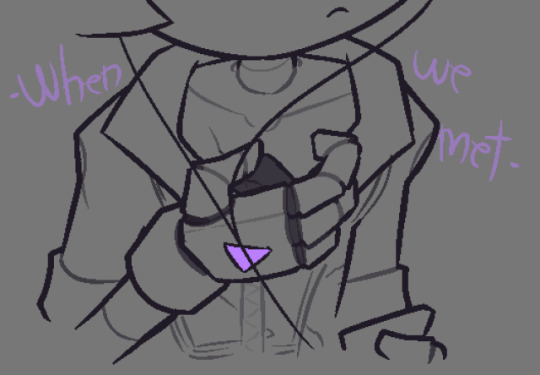





do you ever like wanna make something cool but you dont know how so you just sit around like a moron for 5 hours straight pretending you know how
me neither
on a more serious note i know ad astra as a whole isnt over but i still want to thank daybreaker for their fics. what friends are for was the very first md fic i ever stumbled upon when trying out ao3 for the first time, and prior to joining the server i was checking it near daily for uploads. god knows if i'd be as deep in ao3 as i am now if it werent for this story and convenient timing. Thanks for the story.
#so What Friends Are For is over.#i did nOT CRY. i DO NOT CRY.#the lyrics incorporating the lyrics into the final chapter. daybreaker i HATE YOU#i still get GOOSEBUMPS just THINKING about the lyrics and then you FORCE ME to READ THEM#i thought it would be cool for the lyrics to be from different characters so i just picked kinda at random maybe#would i consider this a long post#gonna say no cause its more grid. be happy i didnt spread them out like i usually do#just pretend all the frames are in a consistent style and also better in every way also#oh i could probably tag daybreaker here but i dont remember their tag#its probably @lady-daybreaker or something but im too deep in this to check now#im not that deep im just lazy#i made uzis beanie look good for ONE PANEL. a SINGLE PANEL#and it was the VERY FIRST ONE#this post sucks im going to sleep#art#murder drones#murder drones n#serial designation n#murder drones uzi#not tagging the lyrics or nori. figure them out yourself bozos#for that one guy who liked how i made the limbs bend in the last one. sorry i got lazy#is there a picture limit
373 notes
·
View notes
Text
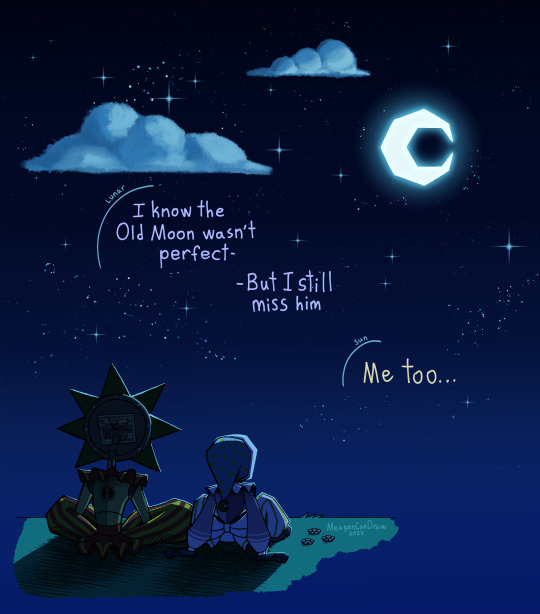
You ever think about how neither of them got to say goodbye?
#TSAMS#Sun and Moon Show#The Sun and Moon Show#TSAMS Lunar#SAMS Lunar#Sun#SAMS Sun#FNAF Sun#FNAF#Five Nights At Freddy's#MeaganCanDraw#I love New Moon a lot don't get me wrong but Old Moon's and Sun's relationship wasn't black and white (as much as NM wants to insist it was#YES Old Moon treated Sun horribly YES he wasn't the best person but#their relationship was also complicated and messy and they both genuinely loved each other despite everything#So much of what they did was for each other and that adds even more to the tragedy of their relationship and Moon's death#Sun and Old Moon's final conversation was them fighting#Moon's final in-person words to him were “I love you and I'm sorry”#to which Sun didn't say anything bc he was mad at him (which I don't blame him for given everything that happened in that episode)#Do you think Sun has realized this? How often does he go back to that moment#How often has he imagined himself saying or doing something different? Something that would've resulted in them leaving that bunker togethe#Meanwhile Lunar lost the person who gave him a new life and a family that actually cares about him#And he was in Moon's head for months and saw first hand how much his regrets and trauma affected him#Both of which would eventually destroy him due to the cycle of self-loathing he was trapped in#How much does HE think about that?#Anyway sorry for not posting for nearly (checks watch) two years??#It'll likely happen again#1k
2K notes
·
View notes
Text


what's ur type
first < prev next >
#YAHOOO#i finally finished editing this first scene in the fic lmfao ... so updates will probably be faster in the coming days#also still unsure as to whether I'll draw... the whole fic#it's like 10k words+ so#im still on like page 4 rn I think. out of like. 20.#let me know what u think tho do u guys want this all drawn out cause .. .. it'll take a lil while also i'll definitely still post the fic#ive put too many hours into that bad boy at this point to let it collect dust#and i think u get something different out of reading that than the comic anyway tbh#which is fun !!#ok enough tag essaying thank u all for reading if u did : )#wut#what's ur type#klance#vld#voltron#my art
1K notes
·
View notes
Text
@kikker-oma
Happy Fan Joy July, Oma!!!
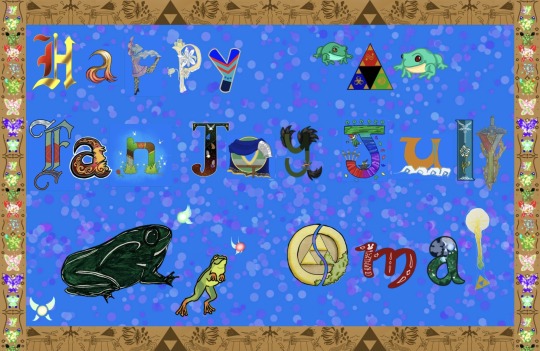
Oma, thank you so so much for making Fan Joy July and sharing it with us! Our fandom, our artists, writers, readers, etc have loved seeing or taking part in this crazy challenge.
This is our gift to thank you- from artists all around who were affected by, or got gifts from, or took part in Fan Joy July. We all love you so much- so we made letters/art for this (Zelda themed!). Many said that they had already wanted to make/write you something, and this gave an opportunity.
One of the things I've loved about this month is how community/interaction centered you made it. The challenge was for yourself to make art each day (you absolute maniac /affectionate)- but then others joined. This July we saw or made art or fics with recommendations. Every day you made art for a writer with a scene from one of their fics, and inspired others to do the same, and writers even wrote every day for an artist based off an art piece they made! This led to a month of gift giving- everyone interacting and getting love for creating.
You truly led to a month of Joy for a lot of loz/lu fans- making the name "Fan Joy July" quite accurate
Thank you, Oma
Thank you for the gifts you gave all of us and the way you inspire others
Additional ramblings and art credits below the cut :P
I'm so grateful to all my artists who stepped up so we could do this when I asked- almost 36 hours and 19 artists. The art is like patchwork, with all these different styles, both traditional and digital put together. But that's exactly what happened- we all got drawn together, just like the other month-long challenges. It's so cool how art always connects people.
The artists who participated are @zolanort @la-sera @nancyheart11 @galenfeadraws @shade-pup-cub @arecaceae175 @isasan347 @ghosthoard @smilesrobotlover @unexpectedstormy @skyloftian-nutcase @knight-of-aether @uniquevoidflowers @jinxedruby @windwakingwhale @skyward-floored @xaeorian @blarefordaglare and me Thank you to all of you- You are all so cool and I'm glad! If I accidentally missed tagging or listing someone please let me know I'm so scared of if that happened djskdjdkd
There are letters based off of the colours/theme of each of the Lu boys- it's mainly Zelda and linkeduniverse themed... but we couldn't not have frogs for Oma! I did a frog, his name is Froggy and I'm very proud.
Here's a picture with a list of who did what-
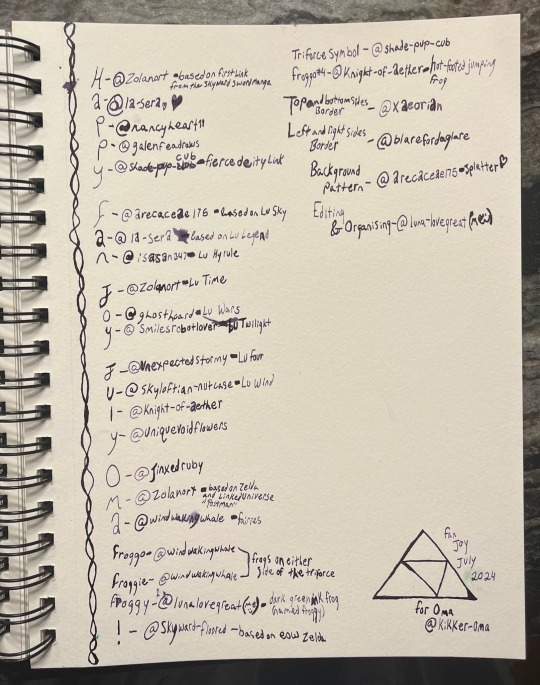
Normally I would apologise for my handwriting, but you guys would just tell me it looks good anyways and honestly it does look good. :D Sorry for the ink splotches tho, and I hope you can read it.
We did this for you, Oma, because... well you are awesome /gen. You gave us the opportunity for a great month and we wanted to say thank you for all the joy you brought us so... thank you :)
Art :D
As for everyone who said they wanted to talk to Oma or other Fan Joy July artists who they loved sharing this month with... feel free to tag and share in the reblogs. Share the joy I guess- there's enough to go around :D
Happy Fan Joy July, Oma :))
#fan joy july#fanjoyjuly#<honestly considered putting a shortcut for that phrase in my phone with the amount of times I said it in DMs and this post#I hope the final result is put together ok- this is my first time doing something this crazy. like a patchwork quilt of love :)#thank you again to all my artists yall came through- this place really is like a family#linked universe#linkeduniverse#Lu#Loz#lu twilight#lu wild#lu four#lu time#lu sky#lu wind#lu chain#lu fic#lu flora#lu legend#lu hyrule#lu warriors#lu wars#lu fierce deity#Lu first#yep those two are there too#did I really just tag all those arsonists? yes yes I did apparently#Oma#my very favourite froggy friend
231 notes
·
View notes
Text









COUNTDOWN TO LOWER DECKS SEASON 5
5 WEEKS – Main Cast
#trekedit#lower decks#star trek lower decks#lowerdecksedit#star trek#startrekedit#scifiedit#animationedit#ld5#it's gonna be weekly posts of these trading card thingies (which are different designs each week btw!) and then#the final week maybe i'll do something daily or every other day or maybe nothing - we'll see! i don't have concrete plans for that yet :)#also. my clown moment of the week was how long i spent last night changing everywhere that said 'betashift' to smileyobrien after i#changed my url :') but it's fine! i did this to myself
188 notes
·
View notes
Text


#vampire hunter d#vhd#art#sketch#Twin and D#my babies#Sorry I'm the most inconsistent poster 💀 I just do it by impulse no rhyme no reason#I was letting it rot for a while before I came to fix some of the dumb stuff#(There's still some things (a lot) but ehh good enough for now)#My birthday is next week maybe I'll try to have something for then uh#Idk if i'll be even able to post on the day though since I might be in the mountains#when I'm there I only have internet when at the brasserie 😭😭#Also I did finally rewatch 1985 the other night but fell asleep at the final battle 💀 (it was 1 am in my defense)
191 notes
·
View notes
Text

I’m finally on break. Thank the lord dude
#homestuck#homestuck fanart#jake english#blooby posting#brobot#hs fanart#I was so unbelievably busy for like a week there#like it was torturous#but we are free now#Also finally took that exam assessment thing#I think I did really well actually. Woof#back to drawing DirkJake and whatever.#I will be on holiday abroad for a little though#I guess I’ll need to draw something for 4/13 before I leave actually
390 notes
·
View notes
Text
i keep coming back to 'i was a functioning alcoholic til nobody noticed my new aesthetic' because i do distinctly remember conversations about how taylor seemed to be drinking a lot more and getting drunk at like every awards show she went to. and those conversations were coming from a place of concern and of hoping that she was alright and that this wasn't a problem.
so to then say 'ugh i can't believe no one noticed this problem i had' when i know that people definitely did, and on the same album say that fans who are genuinely concerned about a new relationship that you are in are just 'bitching and moaning'? what do you want from them? you're talking about so many people who do at least believe that they are coming from a place of care and concern, and you are totally dismissing them on both ends of a scale!
not to mention that her implying that since nobody (???) was noticing her ~aesthetic~ drinking problem she just stopped having it is a bit of a kick in the teeth to people who do have drinking problems and can't just stop having them, since that's not how it fucking works.
#today on things about this album that make me want to scrEAM#just the word aesthetic even being in that sentence. please stop.#i think my cynicism has just been brewing for like a whole year at this point and i finally have something to let it out on#maybe even over a year. i have been saying since the tour was announced that she should do tour and finish the rereleases during it#thats the end of eras. the tour the rerecords all finished.#and then take a break. a proper break with no anything going on.#and then take the time to make a solid new album to be released in say 2025/26#obviously this did not happen lol#okay imma use anti tags i don't want the swifties coming for me but. these opinions are important to me and i wanted to voice them.#cannot guarentee that i will not have more to say on this matter at a later time#anti taylor swift#anti ttpd#mae posts#tw drinking#tw alcohol#tw alcoholism
235 notes
·
View notes